#National Student Power Convergence
Explore tagged Tumblr posts
Text
Over 100,000 people joined a mass anti-corruption rally in Belgrade on Saturday, swarming into the city from all over Serbia by car, on motorbikes and bicycles and on foot to express anger at Aleksandar Vucic’s government and demand official accountability for last November’s Novi Sad train station disaster.
Demonstrators waved flags, blew whistles and airhorns, and chanted the protest movement’s slogan “Pump it!” as they marched through the city, converging on the area between the National Assembly and Slavija Square, where a 15-minute silence was held for the 15 victims of the station accident, which protesters believe highlighted corruption and negligence under Vucic’s government.
All the surrounding streets were packed with protesters and mobile phone lines and the internet were seriously disrupted.
The Serbian Interior Ministry estimated the numbers attending the student-led protest at 107,000 people – one of the largest demonstrations ever seen in the city. However, the Archive of Public Gatherings, an NGO that counts people at protests, estimated that between 275,000 and 300,000 people participated.
The student-led protests, which have continued for more than three months, have become the biggest challenge yet to Vucic’s government since the ruling Serbian Progressive Party came to power in 2012.
One student, in her speech in Slavija Square, said the demonstration was held to show they will not let Vucic’s administration “deprive us of our freedom because we protect one another” – referring to attacks on and arrests of students in the early weeks of the protests, which triggered widespread protest occupations of university faculties across Serbia.
“We are here because we will not let officials of any party organise attacks on students anymore,” the student declared.
Although the protest passed off peacefully, after it was officially over, there was a brief violent incident when a man was beaten up amid a tense atmosphere in front of the National Assembly.
The incident happened near a small encampment of counter-demonstrators loyal to Vucic, where there was a heavy police presence. A defensive line of tractors was parked around the encampment on Friday morning. The counter-demonstrators had become the focus of some of the protesters’ derision and mockery.
In a televised press conference on Saturday night after the protest, Vucic said that 22 people had been arrested during the day but acknowledged that “a surprisingly large number of people came from inside the country” to rally in Belgrade. Vucic has previously described the ongoing demonstrations as an attempted “colour revolution”.
On Saturday morning, streams of vehicles were seen heading for the capital from all over Serbia to join the mass rally, which was held under the name “15th for the 15”. The Serbian state railway company and several private bus companies suspended all their services to Belgrade, causing protesters to claim they were doing the government’s bidding.
Many protest marchers also arrived on Belgrade on foot on Friday evening and received a celebratory welcome from crowds of well-wishers in the capital.
Saturday’s rally was the latest in a series of mass gatherings in the four biggest cities in the country – Belgrade, Nis, Kragujevac and Novi Sad – as well as many other smaller protests in almost every town across the country.
The students leading the protests have four demands, starting with the publication of all documents concerning the Chinese-led renovation of Novi Sad railway station before the deadly disaster last November. The other demands are: the prosecution of all those involved in attacking students and professors during their protests about the disaster, and their dismissal if proven to be public officials; a halt to the prosecution of students arrested during the protests; and a 20-per-cent increase in the budget for higher education.
6 notes
·
View notes
Text
Knives and Pens: A Story of Clarice Sykes and Donaka Mark
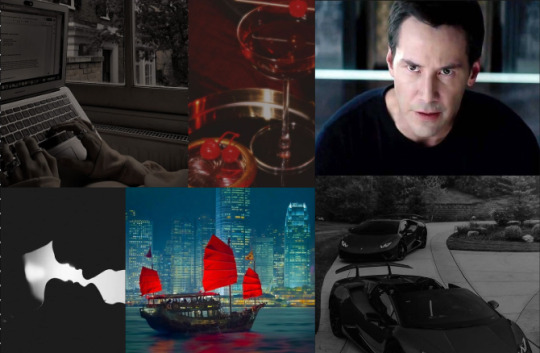
Clarice didn’t come to China to start a war. But in a world where legacy, power, and pedigree are currencies more valued than brilliance, her presence is enough to provoke it.
A foreign scholarship student—older, sharper, and harder to discredit—she steps into the brutal environment of a university dominated by the children of elite men. Among them is Shang, a privileged heir whose charm masks control. And beyond them sits Donaka Mark: silent, calculating, already watching. A man who plays no games because he owns the board.
This is not a love story.
There are no heroes—only two survivors in a slow, deliberate convergence. As Clarice and Donaka circle each other across a landscape of surveillance, manipulation, and unspoken history, Shang shifts from rival to threat. Loyalties will be questioned. Wars will be disguised as dinner parties. And love—if it comes at all—will be the kind that leaves scars.
⚠️ Content & Trigger Warnings (18+):
Strictly 18+ content (explicit sexual themes, strong language, emotional intensity)
Dark romance / morally grey relationships
Power imbalance / psychological manipulation
Obsession & surveillance
Controlling behavior / coercion themes (non-glorified)
No heroes / ethically complex characters
Cold environments: elite power structures, academic competition, foreigner isolation
Alcohol use / substance presence
Emotional vulnerability, trauma and loyalty themes
Sociopolitical undertones (BRICS, class, nationalism)
Slow burn tension
Eventual emotional intimacy tested by fire Ps: Partially in third person, partially in first person. Never in second person.
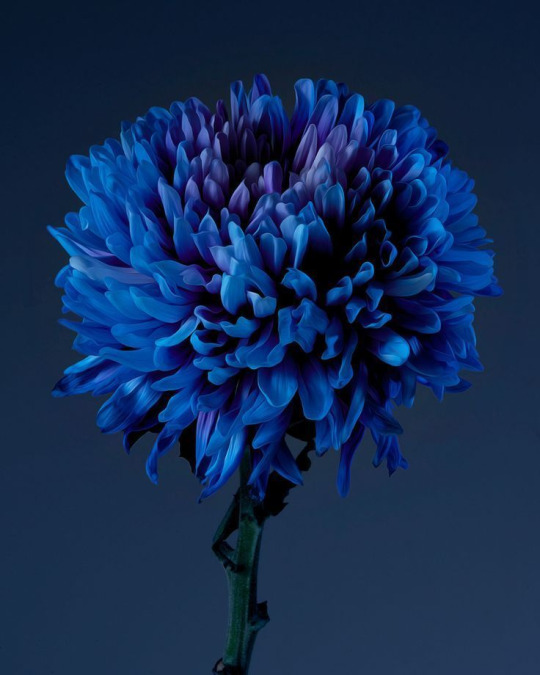
Chapter 1: Chrysanthemum
The smoke curled from the cigar like a ribbon of dissatisfaction, lazily winding toward the chandelier above. Jason leaned back in his chair, one leg crossed over the other, the pout of a boy who’d never known hunger etched deep into his brow.
“She’s unbearable,” he snapped, his Mandarin sharp with the clipped arrogance of someone used to being listened to. “She barely speaks Chinese properly and yet she’s managed to—somehow—gain the favor of three professors in two weeks. Two weeks. She’s auditing graduate lectures. Auditing, for God’s sake. Who does she think she is?”
He didn’t wait for an answer. His father, Chairman Wu, sat beside him with the neutral stoicism of someone who’d long mastered the art of letting his son humiliate himself.
Jason’s tirade continued, “And now the foreign ministry’s calling it a success case. A Brazilian student. From the BRICS exchange, no less. She doesn't come from pedigree. No legacy. No Mandarin roots. She came with a suitcase and perfect grades. And now she’s ahead of me. Me!”
Across the table, Donaka Mark didn’t blink.
He reclined in a seat that wasn’t a throne but may as well have been, his expression unreadable, the dim golden lighting flickering across his cheekbones like firelight over polished stone. He hadn’t spoken since Jason began. Not a word. Not a gesture. Just that look.
That look that felt like standing at the edge of a rooftop with no railing.
Jason fidgeted.
“She’s going to damage the power balance,” he pressed on, sensing the attention in the room beginning to slip away. “She’s not one of us. She doesn’t understand this world. You let someone like that gain ground and suddenly every low-born charity student thinks they’re entitled to our space. Our futures.”
At that, Donaka finally moved. Slowly. Deliberately. He tapped ash into the porcelain tray. Then silence again.
A single breath.
Then—
“So study harder.”
Jason blinked.
The words landed like ice in a scalding bath. Cold. Clean. Brutally efficient.
Donaka didn’t raise his voice. He didn’t need to.
Jason opened his mouth—closed it.
Across the table, Mr. Weizhen exhaled softly through his nose, but said nothing. No one at the table knew that ’s son had once waited five hours in the rain to walk Clarice to the train station. Or that he’d been writing poetry again since her arrival. But Donaka—Donaka might have known. If he cared to look.
Donaka’s gaze shifted toward his glass, then slowly to Jason.
“Jealousy,” he said, “is the confession of your own inadequacy. If she’s better than you, the problem isn’t her.”
Jason’s throat bobbed.
The silence that followed was absolute. ✦✧✦✧✦✧✦✧✦✧✦✧✦✧✦✧✦✧✦✧✦✧✦✧✦✧✦✧✦✧
The room this time was darker, smaller, quieter. A different club — more private. Leather-bound books lined the walls behind smoked glass; the kind no one ever touched. The chandelier above the table glowed low and amber, as if it, too, was listening.
Donaka Mark sat at the head again.
He wasn’t drinking tonight.
Chairman Wu adjusted his cufflinks in silence. Mr. Weizhen stirred his tea. A younger man — Li Tao, son of a logistics magnate — reclined lazily across from Jason, who sat tight-jawed, still licking the wounds from last time.
This evening, an outsider was present: Professor Gao Yanzhi, a neurologist from the university. A man whose brilliance was often undermined by his casual cruelty and apparent indifference to formal ethics. But tonight, he was useful.
“Her age is an advantage,” Jason finally said, voice flat. “No one’s mentioning that. We’re competing against someone who’s not even in our cohort. She’s what, twenty-six? Twenty-seven?”
Li Tao scoffed softly. “That’s not illegal, Jason. Some people don’t get here straight out of diapers.”
Jason turned toward him. “It’s not about legality. It’s about the structure. The foundation. She already had a degree, probably two. She's more mature because she’s older. That’s not intelligence, that’s timing.”
Mr. Weizhen remained silent, but his glance toward Jason was not entirely approving.
Professor Gao interjected, fingers steepled. “Maturity does not arise simply from years. Though, you’re correct in observing hers is... atypical.”
Jason raised an eyebrow. “What do you mean?”
“I administered a neurocognitive development assessment last month,” Gao said smoothly. “Anonymous. Experimental. Measures decision latency, empathy projection, long-term risk analysis. Mostly garbage data — too many external variables. But she stood out.”
Everyone turned toward him now.
“Her profile,” he continued, “shows consistent neurological development of someone roughly three to five years older than her actual age. Meaning she likely developed at that rate from childhood. Cognitively speaking, she isn’t merely older — she’s always been older.”
Jason leaned back, rolling his eyes. “So what, she’s some kind of… gifted kid? Or what? Autistic?”
The word hung in the air like a bad smell.
Li Tao chuckled, but it didn’t reach his eyes. Mr. Weizhen’s expression remained unreadable.
Professor Gao didn’t blink. “Possibly. But even if she were—which remains speculative—it would not explain your academic decline, Jason. Autism, or any neurodivergence, is not a cheat code. In many systems, it’s a disadvantage.”
Jason flushed, lips curling.
“She doesn’t answer the way we’re taught to answer,” Li Tao said then, looking directly at Donaka, as if seeking something deeper. “She speaks fluently, but… she doesn’t follow the unspoken rules. She doesn’t deliver answers that feed into what’s expected.”
Professor Gao nodded. “Yes. She answers honestly, not performatively. It unsettles her peers.”
There was a pause.
Then Donaka finally spoke.
“Truth is often unwelcome in spaces built on ritual.”
The room fell into a colder kind of quiet. Like something vital had been exposed.
Jason stared at him. “So you’re defending her now?”
Donaka looked at him. “No. I’m observing you.”
Jason paled.
Mr. Weizhen stirred his tea again, a ghost of a smile on his lips.
Gao leaned back, satisfied. “You all want a reason that makes her beatable. Neurology. Age. Background. You are looking for excuses.”
No one interrupted him.
“She is not extraordinary because she’s older. Or wired differently. She is extraordinary because she performs at a level none of you expected from someone who wasn’t built by this system.”
Donaka tilted his head slightly. “And that is what makes her dangerous.”
Li Tao gave a low whistle.
Jason stared down at the table, lips pressed thin.
Donaka reached for his untouched glass, then paused.
“Let her keep rising,” he said. “If she cannot survive this pressure, she’ll fall on her own.”
And then, almost to himself: “But if she doesn’t… she’ll change the architecture.”
✦✧✦✧✦✧✦✧✦✧✦✧✦✧✦✧✦✧✦✧✦✧✦✧✦✧✦✧✦✧
I wasn’t sure what Shang wanted from me when he first started circling. Looking back now, I’m still not sure. But he never looked at me as a threat. Not quite as prey either. There was something else in his gaze — not cold, not curious, not strategic.
Maybe that’s why I let him pull me in.
Maybe it was the absence of hostility in a sea of masked expressions that made me fall into his orbit.
I knew, with every cell in my body, that I wasn’t wanted at that after-class dinner. I was a foreign note in a tightly composed symphony. But Shang insisted — politely, then persistently — until it became easier to surrender than resist.
Anywhere else in the world, this would’ve been pizza, hoodies, laughter echoing through a tiled floor. Jeans and messy buns. But this wasn’t any world. This was Hong Kong. Or rather, their Hong Kong.
A different planet.
He knocked on my door right on time, not a second early. When I opened it, I saw the kind of posture that wasn’t learned at school — the subtle bend of his arm extended toward me, the stillness of his face, perfectly composed, like the statues carved to honor imperial generals. The black suit was elegant and understated. Not flashy. Tactical. Like everything else they wore.
My dress suddenly felt like a mistake. The velvet, the embroidery, the silhouette that hugged my waist like it had been sewn there. Maybe I’d gone too far. Maybe I hadn’t gone far enough.
The car ride was quiet. I could feel the perfume on his collar — something faint and citrusy — mixing with the leather seats and my own nerves.
I nearly told him to turn back.
But the moment we stepped into the restaurant, I realized: I wasn’t overdressed.
I was exactly dressed.
Crystal chandeliers glinted like blades overhead. Tables layered in white silk, flanked by people who carried their surnames like swords. Everything shimmered — glass, leather, gold, velvet, lies. I felt a pulse of relief. And then a colder wave: fear.
I belonged. And that meant I would be seen.
Shang’s hand at my back guided me through the sea of scentless wealth. His touch was firm — not inappropriate, but purposeful. Posture corrected. Shoulders straighter.
We passed a table filled with men who didn’t have to speak to own the room. I caught one glance — steel-grey eyes beneath the arch of aristocratic brows — and instinct told me: that was Shang’s father. Shang’s posture shifted subtly, the way a flag straightens under inspection.
I didn’t smile.
The table with my classmates seemed impossibly far away. Jason was already there, predictably, flanked by two girls I didn’t recognize — or didn’t want to. Their dresses clung like they wanted something. Jason’s smirk was oil-slicked, and he was already drinking.
Of course.
The others turned when Shang and I approached. Conversations faltered. Eyes scanned my outfit like a barcode.
For a moment, I considered apologizing for the intrusion that was my presence.
But I sat.
Gracefully.
Chin up.
One of the girls — I remembered her from macroeconomics — gave me a tight smile and said, “Pretty dress.”
I returned the favor with equal sincerity. “Thank you. So is yours.”
She blinked. Hers was clearly expensive, but unimaginative. A logo and a hemline. Mine was art. Mine told a story.
Jason was speaking again, loudly enough for others to overhear.
“I just think no one's talking about the way macro shifts in private equity flow post-stabilization. Everyone's obsessed with instability — but the power is in predicting normalization. Anyone can scream crisis. Few can spot rebalance.”
A few heads nodded around him. One of the girls tittered like he'd solved world hunger.
I sipped water, said nothing. The temptation to comment was sharp. But Shang leaned slightly toward me, as if to remind me: this was a game of patience.
I kept my eyes trained forward — and that’s when I noticed them.
The other table.
Not professors.
Not students.
The sharks.
I didn’t need introductions. You could feel who they were. Men who weren’t loud, but whose stillness drew gravity. Their suits didn’t shine. They absorbed light. Among them, one presence stilled the others — like he was made of a darker element altogether.
Donaka Mark.
I knew who he was before I knew I’d be in this country. His name floated like a shadow through every diplomatic whisper and economic theory. He was a rumor wrapped in human skin.
And now he was watching us.
No — watching me.
Only for a second.
But it was enough.
It was enough to remind me that I had crossed a threshold. And it was too late to go back.
I focused on my glass.
The conversations at our table stumbled forward again — shallow comments, loud theories, someone trying to flirt through wine recommendations. I barely registered them. I felt Shang beside me, steady. I felt the distant gravity of the men a few meters away.
Then someone said: “We should just put the tables together.”
It was a joke.
At first.
Laughter — thin and nervous — passed between the younger ones. Then a pause. A shift. One of the men from the other table nodded without smiling.
Someone — a waiter? a host? — moved with quiet efficiency.
Chairs scraped. Tables shifted.
When I looked up, I realized I was being placed directly across from Donaka Mark.
Shang remained beside me.
Jason was still talking. Still explaining his world to the room, as if volume might bend attention.
But everything else faded.
Donaka hadn’t spoken.
Not yet.
But he hadn’t looked away, either.
And I understood, with bone-deep clarity: the game had just changed.
✦✧✦✧✦✧✦✧✦✧✦✧✦✧✦✧✦✧✦✧✦✧✦✧✦✧✦✧✦✧
Mr. Weizhen watched in silence as the tables were pushed together. The scraping of wood against polished stone echoed louder than it should have — louder than the waitstaff, louder than the laughter that followed. Louder than decorum allowed.
The students at the table shifted with visible discomfort. The girls exchanged glances that bordered on panic — the kind bred into those who were taught how to smile in pearls but never taught how to navigate uncertainty. One of them bit the inside of her cheek until the skin threatened to bleed.
Jason sat back in his chair, shoulders slightly slouched, but his eyes sharp. Dark. Noticing everything. He took another long sip of his drink, the glass tilted with performative ease. Mr. Weizhen didn’t miss the way his fingers clutched it just a little too tightly at the base.
Chairman Wu, as ever, looked content in his own illusion — murmuring something to a server, pretending the wine list mattered more than the shifting gravity of the room.
It wouldn’t be long now. His son had a gift for planting seeds of disruption in the name of social leverage, and an even more unfortunate talent for underestimating the currents beneath still water.
He hadn’t objected when Shang invited the girl. Hadn’t encouraged it either. But he had watched.
Watched her climb, without apology. Watched her speak with sharp precision in lectures where others echoed empty brilliance. Watched Shang hover — just close enough to be mistaken for her guide, but never far enough to be irrelevant.
He could tolerate all that.
What he couldn’t tolerate was the feeling that just crawled over his skin the moment the tables locked together, and he looked up to find Donaka Mark watching.
Not the room.
Not the reshuffled seats.
Not Shang.
Her.
There was no mistaking it — not if you knew what to see.
Donaka wasn’t a man who stared. He was a man who observed. Like a falcon atop a spire — still, silent, but so sharply aware it could cut glass.
Mr. Weizhen didn’t need a full turn of the head. It was enough to see the faint narrowing of Donaka’s eyes, the slight lean of his elbow, the pause between breaths — so precise that it read almost imperceptible.
Almost.
Donaka Mark was curious.
And Clarice — or whatever her full name was — had just become an object of that curiosity.
Which meant one thing.
She was no longer Shang’s.
She may have arrived at the table on his arm, but she belonged to another orbit now. And no one at this table, not even Shang, could rival the pull of a man like Donaka. Not in this world. Not in this city. Not when power took interest.
Mr. Weizhen didn’t sigh. He didn’t flinch.
He simply lifted his glass, let it rest against his lips, and drank with the quiet surrender of a man who had just witnessed the first move of a game he no longer controlled.
What Donaka wanted, he got.
What no one knew — what not even Donaka knew yet — was that this time, what he wanted… would want him back.
✦✧✦✧✦✧✦✧✦✧✦✧✦✧✦✧✦✧✦✧✦✧✦✧✦✧✦✧✦✧
Jason was still speaking business, fluently and confidently — a language that knew how to fly around a room but always seemed to reach me like Aramaic: ancient, coded, and foreign. His words faded into ambiance, like announcements at a distant train station, recognizable as human but impossible to hold onto.
I drifted.
That familiar ache of being but not belonging slipped under my skin like an old cold. It pressed lightly against my ribs as Jason’s voice became a hum, the tail smoke of a train that had already passed too fast to be seen, but left its sound behind as proof it had existed.
His glass was filled with tequila. With ice — unnecessary, excessive.
The girls sipped their champagne like it came with the air.
Shang held a Vesper Martini. I smiled faintly, hearing the voice of the eternal spy murmur into my ear: “Shaken, not stirred.”
His father’s drink was a Negroni Sbagliato — classic, elegant, and vaguely performative. Fitting.
The music filtered in, finally reaching me. A jazz saxophone weaving between piano keys like silk threading through brass. Someone laughed — lightly, not loudly. Polite laughter. Strategic.
I watched hands.
Funny, how people rarely guard their hands. Eyes lie. Posture can be trained. But hands — they always forget to pretend.
Shang’s were shaped like his father’s, but untouched by time. No callouses. Smooth, well-kept. I remembered the first time he touched my hand during a greeting in the classroom. How I flinched at the softness, instinctively curling away. I’d been conscious then of the faint scar between my thumb and forefinger, the writer’s bump on my middle finger, the old bite from my cat when he hadn’t yet learned that affection wasn’t a fight.
One of the girls had nails long enough to declare war on productivity. Bright, lacquered, pristine. Aesthetic over function. Decoration as statement.
I curled my fingers into my palm for a moment, grounding myself in the quiet comfort of nothingness — no pressure. No edge.
Then I saw his hands.
Fingers long, wrapped around an untouched glass of whisky. Not tightly — loosely. Like the glass was a habit, not a desire.
The other hand rested open on the table. Relaxed. Large palm. Callouses that had not been earned recently, but that had stayed, as if refusing to be forgotten. Work, once done, that had imprinted itself in permanence.
A bracelet — silver, or white gold — heavy-looking, resting with regal indifference at his wrist. His black sleeve was rolled up just enough to see the veins at the forearm, like roots running beneath the surface of marble.
I followed upward.
Not because I wanted to — because I had to.
My gaze climbed the line of fabric, the hollow of his throat just visible past the collar, and finally, those eyes.
Donaka Mark.
His gaze did not pierce — it absorbed. A stillness so absolute it bordered on unnatural. His eyes were onyx, but not opaque. Like a well. Deep. Waiting. Not hunting — inviting the fall.
There was no reaction on his face. No smile. No nod. Just observation. The kind that did not ask for your name because it already knew it. The kind that did not blink — not because it was rude, but because it didn’t need to.
For a second, or forever, the music fell away. The room blurred. All I could hear was my own heart — too loud, thudding against bone like it was trying to escape the cage of my ribs.
My hands and feet — cold since birth — were suddenly warm.
And in that silence between us, as the air hung in golden threads and my pulse beat in my ears like a war drum, I saw myself reflected in the dark mirror of his eyes.
Not the version I wanted to be.
The version he saw
They say that a truly good leader never looks away first.
They say it’s about dominance — the primal game of first to blink. The most basic exercise in power. The first weakness to be spotted. You find out more about a man through the things he doesn’t do than the things he does.
Donaka had stopped blinking long before he even sat down.
It wasn’t until his gaze returned
When he looked into the eyes, Donaka didn’t see the reflection of someone intimidated.
He saw the reflection of someone waiting.
And I looked back.
I didn’t lower my gaze. Not because I wanted to prove anything. But because I couldn’t. Because I was waiting too.
That’s what he saw, I think — not a girl trying to resist him, not a woman putting on armor — but someone... waiting.
Not for him. But for something that had never come before. Someone who had been bracing her whole life.
Then the waiter arrived.
He cut between us like a blade through fog, placing a glass in front of me with a precision too rehearsed to be coincidental.
A martini.
I never ordered it.
The stem was cold in the base of my vision. I blinked, as if surfacing. Took a breath like someone waking from a dream I hadn’t meant to have.
Shang leaned in slightly beside me.
"Your usual?" he asked, lighthearted, teasing, but I could hear the faint edge beneath it.
“I don’t have a usual,” I said quietly.
He smiled, but didn’t press. His eyes flicked — once, quick — toward the other end of the table. Then to the drink. Then away.
I looked at it again.
Vesper. Just like his. But subtly different. Less lemon, more gin. Sharper. Colder.
Custom.
I didn’t touch it.
I looked up again — toward the other end of the table.
Donaka wasn’t looking at me anymore. He was listening to someone else now, his head tilted with calculated attentiveness. Someone — I think it was Jason — was speaking again, loudly, something about how Europe would collapse if Germany lost grip on its logistics networks.
A language meant to impress.
Donaka nodded once.
But his hand — the one not holding his glass — tapped once on the edge of the table. Barely a sound. A rhythm that wasn’t quite random.
As if he hadn’t looked away at all.
As if part of him still sat across from me, waiting.
Was Shang not listening all this time? I don't drink. He knew it. Or should've known. I had told him so
When the waiter approached us again, I gently but firmly stopped him
"Thank you, but I don't want it. I don't drink"
Donaka’s fingers on the table stopped tapping. He turned.
They all turned, then — all the young men at the table, and their elders — but his gaze was the only one that didn’t change. It was still cold. Still observing. But there was something else in that gaze now.
A silent question.
The waiter’s eyes moved to Shang, then back to me.
“One time will not make you any bad,” Shang smiled, taking a sip from his drink.
I remained calm, friendly, gentle.
“I thank your expression of gentleness. Even so, I don't drink.”
The air between us settled like silk over stone — soft on the surface, unmoving underneath.
Shang said nothing for a moment. Then he turned back toward the table conversation, as if my refusal had been part of a polite game and not a boundary.
But I felt it.
The shift.
Like I’d taken a step outside the room while remaining seated. A subtle click of awareness — not just from Shang, but from others who had overheard. One of the girls paused her chatter to glance sideways at me. I caught the tail end of a whisper. Jason’s glass met the table with a dull thud.
I didn’t reach for the martini.
And I didn’t explain.
Because people like them — they were used to control being seamless. They were used to women adjusting. A few men at the table shifted in their seats. It was almost imperceptible — the kind of shift that only takes place when a line has been crossed, when the status quo becomes just subtle enough to notice.
Jason was staring
But I had learned, long before this room, how to say no with velvet.
And to say it only once.
“What would be your drink of choice then?”
Donaka’s voice resonated with velvet and metal among us, entering my ears like classical music played by a DJ — refined, deliberate, and slightly out of place in all the right ways.
Once again, I lifted my eyes to him.
Gosh, I could swear I felt something colliding.
A heartbeat.
A flash of a long-ago forgotten warm memory from a friendship cherished.
My expression softened, eyes losing focus for a moment — drifting to a time when things were less complicated, or at least, the world felt like that.
The image of a warm smile and an unshaven beard appeared in front of me for a second. Someone long gone. Someone who never expected me to fold.
I smiled, slightly.
Then I lifted my gaze back to Donaka’s, lips still curved in that same nostalgic softness.
“Angel shot,” I replied, softly, just above a whisper.
Someone chuckled — low, not mocking, but unsure.
Then silence.
A heartbeat.
He blinked once.
Error 404.
Blue screen.
Favour: reinitiating system.
A frown — almost imperceptible — formed between his brows.
The corner of his lips lifted in a ghost of a smile.
Curiosity lit his eyes like a private switch had been flipped.
“Angel shot?” he asked, head tilting fractionally to the right. His head almost reminded of a snake, the way he held it — the way the motion had a coiled grace, the precision of a predator.
"A drink I learn some years ago with a friend. Cold sparkling water, strawberries, cherries, blueberries, mint and wild honey"
The silence lingered.
I didn’t look around to see how the others were reacting. The world, in that moment, had narrowed — not in fear, but in clarity.
Donaka didn’t blink this time.
His head tilted slightly. Not in confusion. In listening. Truly listening. As if the ingredients I named meant something more. As if he knew they did.
The corners of his mouth lifted again, just barely — a half-formed smile, or the echo of a memory he hadn’t placed yet.
Behind us, a glass clinked. Someone whispered something to someone else.
But between us, the quiet remained.
Warm. Unspoken. Real.
A hint of quiet humor flickered in his expression. It almost looked like he was amused.
"Does it taste good?" he asked, arching an eyebrow.
I tilted my head, considering for a moment — but not because I didn’t know the answer. Because the memory was too textured to describe easily.
“Tastes like…” I let the words come with the pace of breath. “…the first morning of winter.”
That earned me a pause. Not dramatic. Not performative. Just… still.
Like something had landed.
A thought. A temperature. A feeling he hadn’t expected.
His eyes stayed on mine, but something about them shifted. As if I had become a riddle he wasn’t planning to solve, but now had to. And for the first time that night, I saw something raw beneath his calm.
The words settled in the air between us, and the moment hung there, suspended, as if the world had paused on a single second.
Someone coughed. Jason muttered something to one of the girls, and I could feel the weight of the room — the way attention shifted, eyes darting and conversations faltering.
But still Donaka’s gaze remained on mine.
Shang’s voice slid back into the space between us like a silk thread tightening.
“She doesn’t drink, but she knows the poetry of it,” he said lightly, his smile aimed at the table, but his words unmistakably directed at Donaka.
I blinked once, letting the echo of winter dissolve from the air between us.
Shang leaned a little closer to me — not too much, not inappropriate — just enough for the gesture to say mine. His arm brushed the back of my chair with casual familiarity.
“She has a talent for descriptions,” he continued, his tone easy, polished. “You should hear the way she dismantled Professor Luo’s economic hypothesis in the seminar last week. Polite, but brutal. Like a scalpel made of velvet.”
A few of the others chuckled. Even Jason managed a smirk, though it didn’t quite reach his eyes.
I offered Shang a glance, composed, unreadable. I knew what he was doing.
So did Donaka.
But Shang’s voice kept going, smooth as lacquer.
“Angel shot,” he mused aloud. “Charming name. I’m sure we could have it made. Our sommelier likes a challenge.”
It was a subtle move — soft enough to avoid confrontation, pointed enough to draw a border.
She sits beside me. She came with me.
I didn’t respond immediately. My fingers traced the rim of the untouched martini glass.
Donaka, meanwhile, said nothing. But his eyes hadn't moved from mine.
The king and the prince had both made their moves.
Now the room was waiting to see which way the queen would turn
The world was on pause.
Jason sipped his tequila, the sound loud and sharp. One of the girls muttered something to a companion, low and conspiratorial, trying to sound hushed but failing.
The waiter shifted uncomfortably, the martini still intact, waiting. And Shang—
He was watching us too, eyes darting back and forth between me and Donaka as if watching a match.
He leaned closer still. I could see the faintest hint of anticipation in his expression.
What will she do?
Whose move will she make?
Shang’s mocking tone in his comment to Donaka did not pass unnoticed.
My expression, though still polite and friendly, wasn’t warm anymore.
But it wasn’t mine that shifted the atmosphere — it was his father’s gaze, suddenly sharp, leveled directly at Shang.
A silent warning.
Of what, I had no idea yet. But it was enough to make the space around us settle with new weight.
“That’s an excellent idea, Shang,” Donaka said, voice smooth as black velvet. He gestured to the waiter with a flick of his fingers — a gesture of effortless command.
The waiter nodded respectfully and turned on his heel, disappearing into the corridor without waiting for Shang’s approval.
That, too, didn’t go unnoticed.
Roughly twenty-five minutes later, the same waiter returned.
Two glasses.
Martini style.
One was placed in front of me.
The other... in front of Donaka.
He looked at the glass, lifted it slightly, eyes glinting with quiet amusement — almost smiling.
I met his gaze, lifted mine as well, and we cheered in silence.
The first sip was taken with my eyes closed.
There it was — the sweetness of the cherry, the acidity of the strawberry, the clarity of the bubbles dancing in the cold. The mint wrapped itself like a ribbon around it all.
But something was different.
The honey.
Not sharp this time — warm. Gentle. A softness that wasn’t there before.
Orange flower honey.
A smile came, still with my eyes closed. Then the bite — unplanned, instinctual — into my lower lip.
“Orange flower honey,” I murmured. “You turned the first morning into the last one.”
My eyes scanned the room until they found the waiter. He was watching me with a mix of curiosity and restrained anxiety.
Poor thing.
“S–so do you disapprove, ma’am?” he asked quickly, almost shrinking into himself. I smiled fully now, eyes opening.
“Oh, not at all. You improved it.”
I tilted my head, letting the warmth of the drink settle in my chest.
“Well done. Very well done.”
Donaka didn't move. Didn't speak.
Just waited — in that effortless, commanding way only a man accustomed to power can.
But his eyes didn't leave mine, and a corner of his mouth lifted — another half-formed smile.
Donaka watched me after the sip. Not the way men usually watched women they were trying to impress — there was no assessment in his gaze. No calculation. Just... presence.
The glass was still in his hand, barely tilted.
“You remember things in layers,” he said, softly. No announcement, no show.
The others were still talking — Jason, Shang, the girls — the table hadn’t gone silent, but I couldn’t hear anything else.
His voice was quiet, meant only for me.
“Flavors, sounds, time. You hold them until they mean something again.”
It wasn’t a compliment. It wasn’t seduction. It was observation. And maybe a kind of confession.
For a moment, I didn’t answer. The cold of the drink lingered in my mouth, but the warmth of his words had reached somewhere far deeper.
“Does that surprise you?” I asked, my voice lower now, instinctively matching his quiet.
His head tilted slightly, that ghost of a smile still there — but smaller now. Real.
“No,” he said. “But it’s rare.”
✦✧✦✧✦✧✦✧✦✧✦✧✦✧✦✧✦✧✦✧✦✧✦✧✦✧✦✧✦✧
Zhao Weizhen watched the exchange in silence.
He had not touched his Negroni since the glasses were served. The ice had melted almost entirely, a dilution unnoticed by him — or unimportant.
The others at the table laughed now and then, sipped, tried to reclaim the mood. But Weizhen was not interested in mood.
He was watching his son.
And he was watching Donaka Mark.
He knew Donaka. Knew his reputation, knew the way men with too much power built their silence like armor. Donaka did not speak to waste time. He did not ask questions without intent.
And yet… here he was.
Asking about drinks.
Watching this girl — the scholarship student, the outsider — with interest not predatory, not superficial, but something worse:
Curiosity.
Donaka Mark was curious about her.
And that… was dangerous.
Weizhen’s gaze shifted to Shang — his son, postured confidently beside the girl, inserting himself like a stake between predator and prey. A move that might have worked… had the girl not already stepped past him.
He had raised Shang to navigate boardrooms, social architecture, subtle games. But Shang, for all his polish, had never learned to see when the game was already lost.
Because this — what was unfolding in front of them — wasn’t flirtation.
It was recognition.
The girl — Clarice — held herself like someone unaware of the match she’d just lit inside the cold temple of a man like Donaka. But Zhao Weizhen knew. He had seen this before. Once.
Long ago.
He took a slow sip of his drink at last, his gaze never leaving Donaka’s face.
He already wants her, Weizhen thought. But he does not yet know how much.
And worse still —
She hasn’t even tried.
✦✧✦✧✦✧✦✧✦✧✦✧✦✧✦✧✦✧✦✧✦✧✦✧✦✧✦✧✦✧
“This needs an alcoholic version,” Donaka suggested after his second sip.
“Yeah,” I chuckled, lifting my glass for another taste. “Put it in one of these—” I gestured to the abandoned glass of whisky beside his left hand—“change the cherries for blackberries, add the wild honey this time, a tip of salt, two drops of lemon… and call it Devil’s Kiss.”
When my eyes found his again, I caught the smirk at the corner of his mouth.
“Genius.”
“I was joking.”
“I wasn’t.”
The words dropped between us like a coin on marble — quiet, but impossible to ignore.
It wasn’t just what he said. It was the way he said it.
Final. Decisive. Like he’d just made a deal with the universe and wasn’t asking for a second opinion.
And that smirk — it lingered, just long enough for me to wonder if this man had ever joked in his life, or if everything he said was a prelude to something real.
The words still hung in the air — I wasn’t — when the faintest movement caught my eye.
The waiter.
He stood just a few steps away, half-hidden behind the edge of a polished column. Pretending to adjust a tray. Failing.
He wasn’t eavesdropping. He was absorbing. Head slightly bowed, jaw tense in thought. I saw his lips move silently once — Devil’s Kiss.
Poor thing. He was already crafting the recipe in his mind, like an alchemist handed a forbidden scroll.
Let him.
Let the legend grow where it pleased.
I turned back toward the table — only to catch the wide, artificial smile of the girl to my right. One of Jason’s companions. Glossed lips, wine glass half-raised, eyes sharp like glass pretending to be crystal.
“That’s such a creative name,” she said sweetly, voice dipped in sugar and chilled vermouth. “Is that… like, a Brazilian thing?”
Jason didn’t look at her. His eyes were on Donaka, calculating. Cold. He’d gone quiet — which was, in his case, the most dangerous kind of noise.
I smiled, unbothered.
“No. Just something I made up.”
The girl’s smile didn’t move. But her eyes blinked once. Resetting.
“Oh,” she said.
Donaka, however, hadn’t moved an inch.
Still watching me with the same composed interest. Not aggressive. Not intrusive. Just there.
Shang shifted slightly beside me, as if reasserting his presence — like a boundary being re-painted after the sea reached too far into the shore.
I leaned back in my chair, crossing one leg over the other, and lifted the glass again. The sweetness lingered on my tongue.
Across from me, Donaka’s fingers traced the rim of his glass once, lazily.
The waiter was already gone again — off to invent a new kind of storm.
Shang’s shoulder brushed mine as he leaned a little closer — a movement small enough to seem accidental to anyone watching.
“Where did you learn that?” he asked softly, voice dipped in careful curiosity. “The drink. That… name.”
His tone had changed. Still polite, but laced now with something else. Caution? Jealousy? Ownership disguised as inquiry?
I turned my head just enough to meet his gaze.
“I didn’t learn it,” I said simply. “I made it up.”
He smiled — that same polished expression that never quite reached the eyes. But I saw the flicker. The edge. The way he took a breath as if to speak again, then didn’t.
Behind him, one of the girls fidgeted with her necklace. Jason drank more than he spoke now, which said enough.
But it was Donaka who remained still — a statue carved from stillness, watching without chasing. It made Shang’s movement feel… noisy.
Too present.
I could feel the shift in him. The instinct to contain, to reassert position. To remind the table — and me — that he was the one who had brought me here. That I was his guest.
But across the room, something else caught my eye.
The waiter.
He was back at the bar now — speaking in a hushed, rapid tone to someone in a black vest. His hands moved with focus: blackberries, lemon, something golden from a small jar.
He hadn’t asked permission. Not from Donaka. Not from me. But the drink — Devil’s Kiss — was already being born.
And it wasn’t lost on Zhao Weizhen.
He hadn’t spoken since the tables were joined, but I saw the shift in his posture as his eyes followed the waiter’s quiet ambition.
He didn’t react outwardly.
He didn’t need to.
But something in his expression changed — a subtle tightening around the mouth, a quiet inhale through the nose.
He was measuring.
Measuring not just the drink, or the influence I hadn’t meant to exert, but the trajectory of the room. The ripple from a glass not yet poured.
And in that silence, I realized something.
This wasn’t about impressing anyone.
This was about displacement.
I hadn’t walked into their world and earned a seat at the table.
I had become the gravity point around which the table was quietly turning.
I thought the moment had passed. A half-joke between drinks. A flicker of amusement shared in the shadow of something much larger.
But I had underestimated the waiter.
He returned not long after, moving through the room with the grace of someone who knew exactly where he stood in the food chain — low, but observant. And wise enough to know that stealing a concept from Donaka Mark’s table was not a sin one survived.
No — he had done the opposite.
He had elevated it.
And made sure the entire room knew where it had come from.
The story must have spread quickly, slipping from server to sommelier to guest, like an ember passed hand to hand.
Angel’s Shot. Devil’s Kiss.
One sweet and ethereal. One dark and dangerous.
Both born within the radius of my pulse.
I was mid-sip when the quiet fell — not on our table, but on one just across the room. The kind of hush that isn’t asked for but simply descends.
Heads turned.
A man had stood — older, his bearing precise, understated. A dark suit tailored without flair but with unmistakable discipline.
At his side sat a woman — visibly pregnant, serene as moonlight, her hands folded around the stem of a pale, sparkling drink.
Angel’s Shot.
In front of him — obsidian liquid in a low crystal glass.
Devil’s Kiss.
I didn’t know who they were. Not yet.
But I could tell by the silence that everyone else did.
The man turned, slowly, deliberately — and lifted his glass.
Toward our table.
Not to Donaka.
To me.
A gesture of recognition. Of respect.
Then he drank.
And only then did he smile — brief, minimal. But sharp enough to draw blood.
A whisper rippled through one of the girls beside Jason. I caught only fragments — “Osaka... too early…” — before she shut her mouth.
Donaka didn’t move.
But he raised his glass in return. Not as a shield. As a mirror.
Zhao Weizhen finally blinked. Just once.
And Shang — poor Shang — leaned in again, voice tight around the edges.
“Do you know who that is?”
“No,” I replied, eyes still locked on the Yakuza man’s table. “Do you?”
His silence told me everything.
The Yakuza man did not approach. He continued his meal beside his wife, neither hurried nor boastful, but the atmosphere around him stayed reverent — as though everyone else was dining near a monument.
A few more glances from neighboring tables. A hush followed his toast like a ghost that refused to leave.
I was about to lift my glass again when something slid into place beside me — a folded rectangle of deep blue silk, laid gently over the rim of my glass by another waiter.
Embroidered at the corner in gold thread: a single chrysanthemum, surrounded by three curved lines.
No one explained it to me.
And yet it was clear that everyone at our table knew what it meant.
Even the girls stopped pretending to sip their drinks.
Shang stiffened.
Jason muttered something under his breath, but I didn’t care to parse the words.
Only Donaka moved naturally — as if he had expected this all along. His voice reached me smoothly, just as I was brushing my fingers over the embroidery.
“It’s a symbol,” he said, “of acknowledgment. Quiet, but public. Not a gift. A gesture. It means you've been... included.”
“Included?” I asked, brows gently furrowing. “Into what?”
He looked at me then — slowly — and for the first time, the expression he wore was not amused, nor curious. It was almost reverent.
“Into memory,” he replied. “They will remember you now. And you need to respond.”
I turned my head fully to him, warmth still steady in my voice.
“Teach me then.”
It came out softer than I intended. Not submissive. But open. Earnest.
Donaka watched me for half a beat longer.
Then he stood.
The movement was quiet, slow, deliberate.
He pulled his jacket off with precise efficiency — no arrogance in the gesture, just purpose. The silk lining caught the light before vanishing into the air as he handed it to the nearest server.
His shirt sleeves were rolled up in a swift, practiced motion, revealing forearms marked by muscle and memory.
And then, he stepped behind me.
Leaning forward — not too close, not invasive — just enough that I felt the whisper of his breath against my hair.
“Excuse me,” he said gently.
Then his arms moved — over mine, guiding.
His hands came to rest lightly atop mine, the warmth of his palms grounding me instantly.
“Chin down, eyes steady. Hands like this.”
We moved together — slowly — shaping the silk into a fold I couldn’t have guessed. His fingers adjusted mine with unhurried certainty. Like he’d done this before. For someone else. A long time ago.
Or maybe never.
Maybe this was the first time he ever taught someone gently.
I didn’t look around, but I felt it.
Shang had gone completely still. Jason’s drink was trembling slightly in his grip. Even Zhao Weizhen, silent general that he was, had finally turned his head just a little — the most emotion he’d shown all night.
Donaka’s voice brushed the back of my ear.
“There. Now place it back.”
I lifted the silk-wrapped token and turned. Every pair of eyes watched my hand as I placed it softly on the tray the waiter still held.
No words.
Just a gesture in return.
Donaka stepped back. Not possessively. Not dramatically.
Just present.
Like a king who had nothing to prove — and yet had just proven everything
✦✧✦✧✦✧✦✧✦✧✦✧✦✧✦✧✦✧✦✧✦✧✦✧✦✧✦✧✦✧
Shang didn’t move.
Couldn’t.
The air around him had stilled, frozen in the moment Donaka’s hands settled over her wrists.
It wasn’t about proximity. It wasn’t even about touch.
It was how he touched her.
With authority, yes — but with a care that was harder to place. Something that felt... private. Instructive. Natural.
Like he wasn’t teaching her for the first time, but merely reminding her of something her body already knew.
And she followed. Not clumsily, not uncertainly, but with a kind of elegant surrender — one Shang had never seen in her before.
And never with him.
The sound of Donaka’s voice so close to her ear was barely audible, but Shang saw the way her eyes closed briefly. As if those words landed not just in her mind, but somewhere beneath her skin.
The silk cloth — that cursed, delicate symbol — was folded perfectly between their hands. A flower blooming under pressure.
When she placed it back on the tray, the entire room watched.
And Donaka — Mr. Mark — stepped away with the calm of a man who knew every eye was on him, and cared for none of them. Except hers.
Shang gripped the stem of his martini glass tighter than necessary.
His jaw clenched, but he didn’t speak.
Because what would he say?
That the girl he had brought here, paraded in front of power, had become the center of it before dessert?
That the man whose approval he had chased for months — whose deals and shadows he hoped one day to orbit — had just leaned over his guest like she belonged to a world he could never touch?
The drink stung the back of his throat.
Jason was watching too, expression unreadable.
Even the girls beside them had gone silent, eyes flicking between the three of them like they were watching a match they didn’t buy tickets for.
And his father — Zhao Weizhen — hadn’t said a word.
But he was watching. And that silence said more than any rebuke ever could.
Shang didn’t need a reminder.
He had already lost the room.
The tray was gone.
The silk token returned, the gesture complete — and yet, the room hadn’t resumed breathing.
Not really.
I felt the shift the way one feels a change in weather — not sudden, but certain. A quiet drop in temperature. A new current running beneath every word not spoken.
Donaka stepped back without flourish, without need for it. He said nothing more. His jacket was still off, sleeves rolled high. I could still feel the echo of his hands over mine.
And yet it wasn’t possession I felt.
Not from him.
It was something more dangerous. Something that asked nothing — but took everything, simply by being noticed.
I hadn’t looked at Shang again until that moment.
He was watching me. Not with fury. Not even with suspicion.
But with something warmer. Quieter.
A searching glance.
Like someone not ready to give up the race, even after the finish line had been moved.
He raised his glass subtly. Not a toast — a signal. One only I would see.
And I understood it instantly.
I still see you. You are still here with me.
I smiled, small and genuine, and tilted my glass in return.
We weren’t pretending. We weren’t denying anything.
We were just… still something.
Even if the shape of it was changing.
The music returned softly around us. The clink of glasses. The faint laughter from other tables.
But the echo of that moment — of his hands on mine, of Shang’s quiet refusal to be erased — stayed.
And would stay, I knew, long after this dinner ended.
The tray was gone.
The silk token returned, the gesture complete — and yet, the room hadn’t resumed breathing.
Not really.
I felt the shift the way one feels a change in weather — not sudden, but certain. A quiet drop in temperature. A new current running beneath every word not spoken.
Donaka stepped back without flourish, without need for it. He said nothing more. His jacket was still off, sleeves rolled high. I could still feel the echo of his hands over mine.
And yet it wasn’t possession I felt.
Not from him.
It was something more dangerous. Something that asked nothing — but took everything, simply by being noticed.
I hadn’t looked at Shang again until that moment.
He was watching me. Not with fury. Not even with suspicion.
But with something warmer. Quieter.
A searching glance.
Like someone not ready to give up the race, even after the finish line had been moved.
He raised his glass subtly. Not a toast — a signal. One only I would see.
And I understood it instantly.
I still see you. You are still here with me.
I smiled, small and genuine, and tilted my glass in return.
We weren’t pretending. We weren’t denying anything.
We were just… still something.
Even if the shape of it was changing.
The music returned softly around us. The clink of glasses. The faint laughter from other tables.
But the echo of that moment — of his hands on mine, of Shang’s quiet refusal to be erased — stayed.
And would stay, I knew, long after this dinner ended.
The air returned to the room, little by little.
Forks clinked. Someone laughed too loudly to prove they could. The weight of watching eyes faded into background noise again, but I still felt the trace of them on my skin.
Shang leaned back in his chair, one arm draped casually along the back of mine — not a claim, but a reminder. His glass caught the light. So did his smile.
And though Donaka’s presence still hummed just across from me — undeniable, composed, silent — it was Shang’s voice that reached my ear this time.
“Next time,” he murmured, “I’ll be the one to teach you something.”
I didn’t answer.
But I didn’t pull away.
youtube
Setting the vibe
4 notes
·
View notes
Text
The Rhodes Scholarship Result: A Journey of Aspiration, Reflection, and Growth
As one of the most prestigious and aggressive international scholarships, the Rhodes not simplest offers the opportunity to take a look at at the University of Oxford however also stands as a image of educational excellence, management capacity, moral force of person, and dedication to provider. For those who get hold of it, the end result regularly marks a lifestyles-changing milestone. For folks that do not, the adventure stays a powerful bankruptcy of their private and expert development.
Rhodes Scholarship Requirements
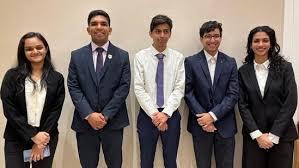
Understanding the Rhodes Scholarship
Established in 1902 beneath the desire of Cecil Rhodes, the Rhodes Scholarship is one of the oldest and maximum outstanding scholarship applications within the international. While it began with students from the British colonies, the USA, and Germany, the scholarship has extended significantly and now consists of pupils from over 20 special constituencies, overlaying more than 60 nations.
Literary and scholastic attainments
Energy to use one's abilties to the total (as established via mastery in areas consisting of sports activities, song, debate, dance, theatre, and artistic pastimes)
Truth, courage, devotion to obligation, sympathy for and safety of the vulnerable, kindliness, unselfishness, and fellowship Moral pressure of individual and instincts to guide
The Selection Process
The Rhodes Scholarship choice technique is one of the maximum rigorous and aggressive within the global. Applicants ought to submit a comprehensive file, inclusive of non-public statements, educational transcripts, letters of advice, and evidence of extracurricular engagement. Those shortlisted are invited for a final interview, which regularly includes a proper dinner and a series of conversations with Rhodes alumni and selectors.
The final interview, frequently referred to as the maximum severe half-hour of an applicant's life, isn't absolutely about trying out information. It delves into character, vision, resilience, and the depth of notion. Selectors are looking for those who not simplest excel however who own the braveness and perception to cope with complicated international demanding situations.
The Moment of the Result
When the outcomes are in the end released—normally in November for many constituencies—a flood of emotion follows. For successful applicants, the instant is surreal. Years of difficult paintings, past due nights of look at, volunteer projects, and the pursuit of cause converge in that one lifestyles-altering message: “Congratulations, you've got been decided on as a Rhodes Scholar.”
It isn't always just a victory—it is an confirmation. Affirmation that their values, aspirations, and paintings ethic have found resonance in a worldwide area. For many, the opportunity to join a network of extremely good minds from internationally is as humbling as it's miles empowering.
After making an investment time, power, and desire into the manner, rejection can feel like a non-public failure.The Rhodes Scholarship gets heaps of applications from the world’s exceptional and brightest. To even be considered, or to attain the interview level, is itself an honor that displays wonderful promise and capability.
Reflections from a Rhodes Scholar
For many Rhodes Scholars, the end result is simply the beginning. The scholarship gives far greater than a fully funded training. It immerses students in an intellectually vibrant and socially conscious environment in which conversations undertaking assumptions, friendships span continents, and projects aspire to global importance.
The Rhodes House at Oxford becomes a crucible for ideas and collaborations. Scholars regularly describe the network as one that pushes them to suppose larger, to impeach extra deeply, and to act greater boldly. Whether in public service, academia, business, or activism, Rhodes Scholars are encouraged to stay lives of which means and service.
As one pupil reflects: “Winning the Rhodes Scholarship turned into not the give up of my adventure—it become a call to a higher purpose. I became no longer just a pupil; I had a obligation to the arena and to the values that earned me this opportunity.”
Reflections from Those Not Selected
Equally essential are the stories of folks who have been now not selected. Many cross directly to end up influential leaders, thinkers, and changemakers of their own proper. The system, although competitive, regularly sharpens clarity of purpose. Applicants often say that writing the Rhodes non-public announcement helped them articulate their lifestyles’s assignment extra truely than ever before.
The enjoy of going thru the selection, attractive with first rate peers, and reflecting deeply on one’s values often ends in extra self-recognition and resilience. Many find new doors opening—different fellowships, graduate applications, leadership roles, or surprising life directions. The Rhodes end result, whether or not wonderful or terrible, often serves as a catalyst for future increase.
As one applicant who became now not decided on put it: “The Rhodes wasn’t my vacation spot—it turned into a replicate. It showed me who I became becoming and reminded me of why I do what I do. The rejection hurt, yes. But the motive it helped me discover has stayed with me ever due to the fact that.”
Conclusion: More Than a Result
Ultimately, the Rhodes Scholarship result is about more than a single declaration—it’s approximately what that second represents. For a few, it's miles a launchpad into one of the most enriching reviews of their lives. For others, it is a stepping stone, a reflective checkpoint that sharpens their goals and resilience.
Success inside the Rhodes process is not pretty much the scholarship; it’s approximately the adventure—about striving for some thing significant, enticing with one’s deepest values, and bold to dream ambitiously.
Whether one gets the scholarship or not, the manner fosters growth, readability, and braveness. And in a global that desires bold and compassionate leadership greater than ever, the ones are results really worth celebrating.
Erasmus Mundus Scholarship
Scholastic Assessment Test
When Will Common Wealth Scholarship Result Come Out
Fulbright Scholarship Result Requirement
2 notes
·
View notes
Note
Don't mean any offence or anything but
Why does everyone hate modi sm?
oh dear if only we had one reason because games and jokes aside he's been a terrible national leader, specially in his second tenure. His government is thriving on anti muslim propaganda, they control the converge of news to such extent that news channel talk about shitty movie stars instead of dying farmers and students, the economy has pit fallen, there were unspeakable riots and crimes happening in north east and they chose to ignore it until it got terribly worse that public had to plead them, they're literally thriving on divide and rule and not even trying to hide atp, his blind followers? they are pro Israel because Palestinians are muslims, there are ministers charged with assault in power like uhm yeah
17 notes
·
View notes
Text
❝extraterrestrial being❞

✭ pairing : various x reader
✭ fandom : my hero academia x reader
✭ summary : "Extraterrestrial Being" is a thrilling fictional science fanfiction that takes place on the first day of training at UA, an elite academy for aspiring heroes. This action-packed story follows a group of determined students as they encounter an extraordinary event that turns their world upside down. As the students gather for their first training lesson, an unexpected incident occurs: a spaceship crashes right in the middle of the training ground, creating chaos and excitement among the students and their instructors. The crash is unlike anything they've ever witnessed before, and the suspense builds as they wonder what lies beyond the wreckage. To their amazement, out steps an alien female, an extraterrestrial being unlike anything they've encountered. With her strange appearance and advanced technology, the alien quickly captures the attention and curiosity of the students. As they attempt to communicate with her, they realize they must put their training to the test and work together to understand her intentions and prevent any potential danger.
✭ word count : 1,505
✭ chapter one
✭ extraterrestrial being masterlist



The sun crept above the horizon, bathing the U.A. High School campus in a soft, golden light. The promise of a new journey hung in the air as students from across the nation converged, carrying dreams of becoming the next generation of heroes. The weight of their aspirations mingled with the air as they embarked on the first step of their heroic odyssey.
In the midst of the bustling classroom, Shota Aizawa stood up from his yellow sleeping bag unnoticed, with an air of quiet authority. His unruly black hair swayed gently from a nearby breeze, and his scarf fluttered around his neck like a flag of challenge. His gaze, sharp and calculating, swept over the students before him, a mixture of emotions visible in their eyes.
"Listen up," Aizawa's voice cut through the anticipatory chatter.
“Okay. It took you all 8 seconds before you were quiet. Time is limited. You kids, are not rational enough.”
"You're here to become heroes, but that journey starts now. Get dressed, put on these training suits," he continued, tossing a bundle of neatly folded garments onto a students nearby desk. "Meet me at Training Ground 1 in ten minutes."
Excitement rippled through the crowd as the students eagerly grabbed the training suits, their hearts racing with the realization that this was the beginning of their dreams. In the midst of the crowd, Izuku Midoriya clutched the fabric in his hand, his green eyes alight with a mixture of awe and determination. Ochaco Uraraka's fingers brushed over the suit's material as she exchanged a hopeful glance with her newfound friends.
Katsuki Bakugo's fiery ambition was mirrored in his clenched fists as he strode forward, his explosive power practically crackling in the air around him. Shoto Todoroki's icy composure gave way to a flicker of curiosity, while Tenya Iida stood tall, his rigid posture a testament to his unwavering sense of responsibility.
The students regrouped at Training Ground 1, each clad in the training uniforms that potentially past heroes had once wore. Aizawa's eyes bore into them, a silent challenge etched into his features.
"Today, you'll be tested physically, mentally, and strategically. Your quirks, your skills, and your teamwork will all be put to the test. This is your initiation, your first step on the path to becoming heroes," Aizawa's words held a weight that sent a shiver down the students' spines.
”Therefore you’ll will be participating in this Quirk Apprehension Test.”
A hushed silence fell over Training Ground 1 as Aizawa's words hung in the air like an ominous cloud. The students of Class 1-A exchanged wary glances, the weight of his declaration settling heavily on their shoulders. Quirk Apprehension Test – those three words carried the promise of both challenge and uncertainty.
Midoriya's heart raced as he absorbed the implications. His mind whirred, calculating the potential outcomes and the significance of the test's consequences. Beside him, some students cheerful expressions had paled, replaced by a mixture of concern and determination.
Aizawa's gaze swept over the class, his expression unyielding. "This test will assess the control and application of your quirks," he continued, his voice unwavering. "The person in last place will be expelled."
The declaration was met with a collective gasp. Shocked whispers erupted, spreading like wildfire through the class. Students exchanged worried glances, their expressions a mosaic of disbelief and indignation.
"But that's not fair!" A voice rang out, their frustration echoing the sentiments of many. "We just got here, and they're already threatening to expel someone?"
Another students eyes narrowed, "This isn't what we signed up for. We're here to become heroes, not to be pitted against each other like this."
"We're supposed to be a team, right? How can we work together when we're constantly competing like this?"
The protestations grew louder, the students' voices blending into an uproar. "I didn't come here to get expelled on the first day,"
Aizawa's gaze remained unmoved by the chaos unfolding before him. He allowed the students to voice their concerns, their frustrations, their fears. The tumultuous chorus of voices was a testament to their unity, a bond formed in the face of adversity.
Finally, as the crescendo of protest began to subside, Aizawa's voice cut through the noise like a blade. "This test isn't about showing your individual strength," he stated, his tone firm. "It's about learning to overcome challenges and work together. Heroes need to be adaptable, resourceful, and capable of thriving even in the face of adversity."
The words hung in the air, a moment of contemplative silence settling over the class. Aizawa's words held a measure of truth, a reminder that the path to heroism was one of constant growth and evolution.
The students exchanged glances, the tension in the air slowly easing. Their protests had been heard, their frustrations acknowledged. As the sunset cast a warm glow across the training grounds, a newfound sense of unity began to replace the initial uproar.
"What about the entrance ceremony? The orientation?" Uraraka asked in complete bewilderment.
"If you're going to become a hero, you don't have time for such leisurely events. UA's selling point is how unrestricted its school traditions are. That's also how the teachers run their classes," Aizawa stated, turning his face towards the students. He paused to let them take in the information before continuing.
"You kids have been doing things like this since junior high, too, right? Physical fitness tests where you weren't allowed to use your quirks. The country still uses averages taken from results from students not using their quirks. It's not rational. Well, the Ministry of Education is procrastinating," he said.
"Bakugou, you placed first at the top of the practical exam, right? In junior high, what was your best result for the softball throw?" Aizawa asked whist looking at said boy.
"67 meters," he replied.
"Then, try doing it with your quirk," Aizawa instructed. Bakugou proceeds to walk over to a circle with measurement lines outside of it when Aizawa continued to give directions. "You can do whatever you want as long as you stay in the circle. Hurry up. Give it all you've got," he instructed.
Bakugou then turns to where the measurement lines are located and starts to stretch his limbs out. He then takes a step forward and throws the ball with an explosion coming out of his palms to blast the ball further away from him.
‘Heh, I’ll blow all these extras away and show them how awesome I am!’
"DIE..!" he yells as he throws the ball up into the air, a powerful explosion following after, exiting from within the palm of his hand.
"Know your own maximum first," Aizawa stated as the ball started to finally fall.
"That is the most rational way to form the foundation of a hero," he continued as he holds up a screen that shows the number 705.2 on it. All the students, minus a few, screamed out in exasperation and started to say things such as “this was going to be fun.”
“It looks fun, huh? You have three years to become a hero. Will you have an attitude like that the whole time? Whoever comes in last place will be judged to have no potential and will be punished with expulsion," he said with a menacing grin. Everyone is shocked and makes it known as they yell in exasperation.
“We're free to do what we want about the circumstances of our students. Welcome to UA's hero course!" He adds and even now he can see that some students get encouraged by his statement while others, namely Midoriya, get even more nervous.
"Last place will be expelled? But it's the first day of school! No, even if it wasn't the first day of school, this is too unfair!"
"Natural disasters, big accidents, and selfish villains. Calamities whose time or place can't be predicted. Japan is covered with unfairness. Heroes are the ones who reverse those situations. If you want to go talk with your friends after school, too bad. For the next three years, UA will do all it can to give you one hardship after another. Go beyond. Plus Ultra. Overcome it with all you've got," Aizawa encouraged.
'He is right though. Life is full of unfairness and as his job as a teacher, he has to get his students ready to become the best heroes that they can be by acting like the real world. The only way to beat life's unfairness is to tackle it the best
they can...” Izuku thought, ‘I’ll try my best’ clenching his fist at his side, ‘I’ll do all that I can and show All Might that I’m deserving of this quirk!’
"All right, demonstration's over. The real thing starts now," Aizawa stated.
#extraterrestrial being#extraterrestrial being series#extraterrestrial being masterlist#bnha x y/n#bnha x reader#Bnha x alien reader#my hero academia masterlist#my hero academia x y/n#my hero academia x you#my hero academia x reader#x reader#x reader series
20 notes
·
View notes
Text
[ad_1] Paromita Das GG News Bureau New Delhi, 14th Jan. The Maha Kumbh, a spiritual gathering of unmatched scale, is often celebrated as a sacred convergence of faith, culture, and humanity. Yet its historical role as a catalyst for Bharat’s independence struggle and its enduring influence on the nation’s socio-political awakening remains conspicuously absent from mainstream narratives. As Maha Kumbh 2025 approaches, with over 400 million devotees expected to gather at Prayagraj from January 13th, it is imperative to revisit the event’s profound legacy—not just as a religious phenomenon but as a crucible of resistance, unity, and nationalistic fervor. Beyond its spiritual significance, the Maha Kumbh has historically served as a platform for deliberating on the pressing socio-political issues of its time. It was not merely a religious congregation but a site where political movements were nurtured, cultural pride was reasserted, and resistance to imperial powers was born. This dual identity—spiritual and political—underscores the essence of the Maha Kumbh and its unparalleled role in shaping Bharat’s history. The Spark of 1857: Maha Kumbh and the First War of Independence The Maha Kumbh’s contribution to Bharat’s struggle for independence began during the pivotal year of 1857, when the country witnessed its first war of independence. Amidst the uprising, Prayagwal priests, led by figures like Pandit Radheshyam, spearheaded resistance against British imperialism. Incensed by the British-supported Christian missionary activities that demonized Hindu traditions, the Prayagwals and local leaders took a stand, making the Kumbh Mela a site of rebellion. The British, recognizing the unifying power of the Kumbh, sought to dismantle its influence. In a calculated move, British Colonel Neel bombarded the Kumbh site in 1857, hoping to quell the growing dissent. Yet, the defiance of figures like Pandit Radheshyam—who was eventually hanged for his efforts—became a symbol of resistance that reverberated across the nation. Following the rebellion, the British converted the Kumbh area into a cantonment, restricting entry and banning akhadas from participating. The Sangam Teerth, the spiritual epicenter of the Kumbh, was guarded zealously, and access was limited to one or two priests. Despite these restrictions, the Kumbh remained a hotbed of nationalist activity, inspiring future generations to fight against colonial oppression. Kumbh’s Role in Nurturing Nationalist Movements While the 1857 rebellion marked the beginning of the Kumbh’s political significance, its impact grew over the decades. The Kumbh became a meeting point for leaders, thinkers, and revolutionaries who sought to awaken Bharat’s collective consciousness. In the 1906 Kumbh, the Sanatan Dharm Sabha, under the leadership of Pandit Madan Mohan Malviya, pledged to establish the Banaras Hindu University (BHU). This institution was envisioned as a bastion of Bharatiya culture and knowledge, countering British propaganda that sought to undermine Bharat’s intellectual and cultural heritage. BHU went on to play a critical role in the independence movement, with its students and faculty participating in the Non-Cooperation Movement and aiding freedom fighters like Bhagat Singh, Sukhdev, and Rajguru. The university’s hostels became sanctuaries for revolutionaries, while its classrooms inspired a generation of youth to fight for Bharat’s freedom. The British, acutely aware of the Kumbh’s role in fostering resistance, monitored the event closely. During the 1942 Quit India Movement, rumors of Japanese bombing at the Sangam Teerth were deliberately spread to deter attendance, showcasing the colonial administration’s fear of the Kumbh’s potential to ignite mass uprisings. Erasure of Kumbh’s Role in History Despite its undeniable contribution to Bharat’s independence struggle, the role of the Maha Kumbh has been systematically erased from mainstream historical narratives. Post-independence,
the Congress-led government focused on consolidating the freedom movement’s legacy around figures like Gandhi and Nehru. While these leaders undoubtedly played pivotal roles, this selective narrative sidelined the contributions of Hindu leaders, communities, and events like the Kumbh that were instrumental in uniting Bharatiya against colonial rule. This omission served to bolster Congress’s secular credentials while downplaying the sacrifices made by Hindus as a collective. The role of the Maha Kumbh and figures like Pandit Radheshyam challenges this narrative. It reveals a history of grassroots resistance and cultural pride that transcends individual leaders and reflects the spirit of an entire community. Maha Kumbh 2025: A Modern Reflection of a Timeless Legacy As Maha Kumbh 2025 approaches, its spiritual and cultural significance remains unparalleled. The event continues to serve as a unifying force, drawing millions of devotees from diverse backgrounds to the sacred confluence of the Ganga, Yamuna, and Saraswati rivers. Yet, this year’s Kumbh also provides an opportunity to reflect on its historical legacy and its role in shaping Bharat’s identity. By revisiting the Kumbh’s contributions to the freedom struggle, Bharat can reclaim a forgotten chapter of its history and inspire future generations to honor the sacrifices of their ancestors. Reclaiming the True Essence of the Maha Kumbh The Maha Kumbh is more than a religious gathering; it is a testament to Bharat’s resilience, unity, and cultural pride. Its historical significance, particularly in the context of Bharat’s freedom struggle, deserves greater recognition in public discourse and education. Ignoring the Kumbh’s contributions not only distorts history but also undermines the sacrifices of those who fought for Bharat’s independence. By acknowledging this legacy, Bharat can foster a deeper understanding of its cultural heritage and inspire a sense of pride and unity among its citizens. The omission of the Kumbh’s role in history books reflects a broader failure to celebrate Bharat’s diverse and multifaceted freedom struggle. It is time to rectify this oversight and ensure that the Maha Kumbh’s legacy is preserved and celebrated for generations to come. Conclusion: A Legacy Worth Celebrating The Maha Kumbh is not just an ancient tradition; it is a living embodiment of Bharat’s spiritual and cultural heritage. Its role in uniting people, fostering resistance, and inspiring change is a testament to its enduring significance. As the world’s largest religious gathering, Maha Kumbh 2025 is a reminder of Bharat’s unique ability to harmonize faith, culture, and collective action. It is an opportunity to honor the sacrifices of those who fought for freedom and to celebrate the spirit of unity that defines the nation. In revisiting the Kumbh’s history, Bharat can reclaim a legacy of resilience and pride, ensuring that the sacrifices of its past continue to inspire its future. The Maha Kumbh is not just a celebration of faith—it is a celebration of Bharat itself. The post Maha Kumbh: The Forgotten Pillar of Bharat’s Freedom Struggle and Cultural Awakening appeared first on Global Governance News- Asia's First Bilingual News portal for Global News and Updates. [ad_2] Source link
1 note
·
View note
Text
The Turmezistan Pyramid
As China, Russia, and the USA prepared for a three-way war around the contested territory of Turmezistan, their fingers on the triggers, the leaders of the three most powerful militaries on planet Earth unexpectedly declared peace. What lead to this welcome turn of events? What miracle averted a potential third world war? Most will tell you it was an act of incredible diplomacy on behalf of the UN Secretary General. The truth, however, is much stranger. Because in 2017 a pyramid that was over 5000 years old was discovered in Tumezistan.

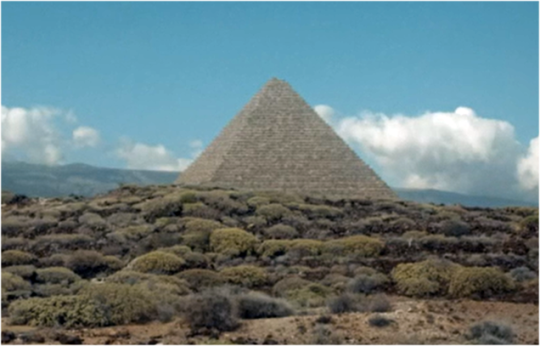
With military eyes constantly scanning the entire area, a pyramid appeared right in the middle of three military powerhouses ready to converge. It seemed to be ancient, and all tests concurred that it was. However, the structure had not been there the day before. It simply appeared there, as if it had always been there. This triggered a state of crisis.
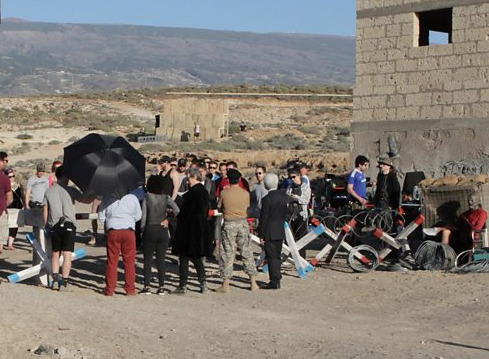
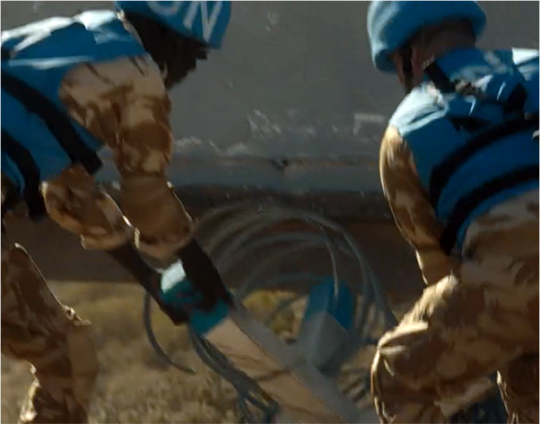
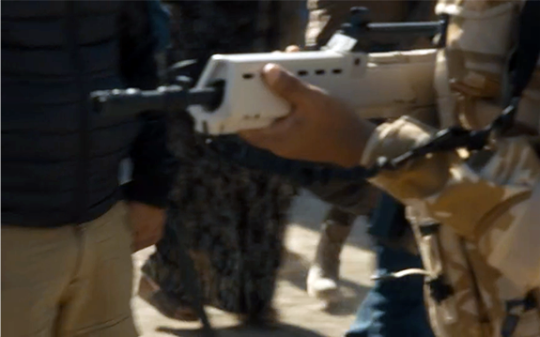
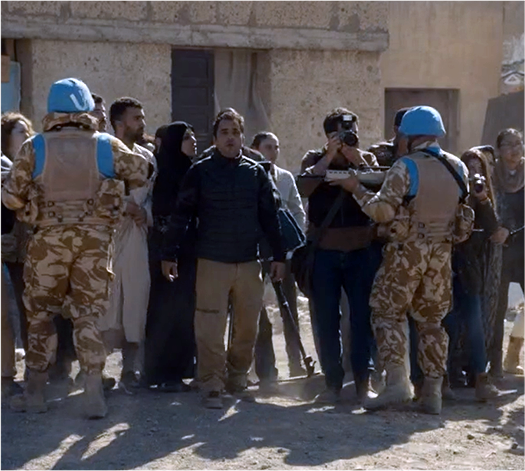
The world's press flocked to the area, but soon the United Nations pushed them back. Barricades were erected and journalists were encouraged to keep clear.
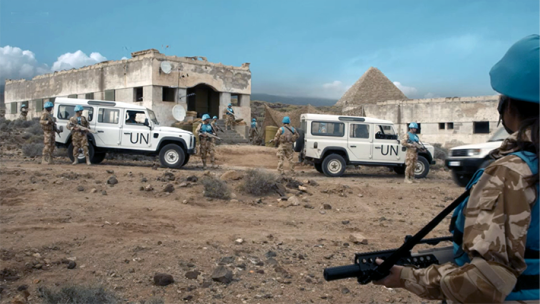
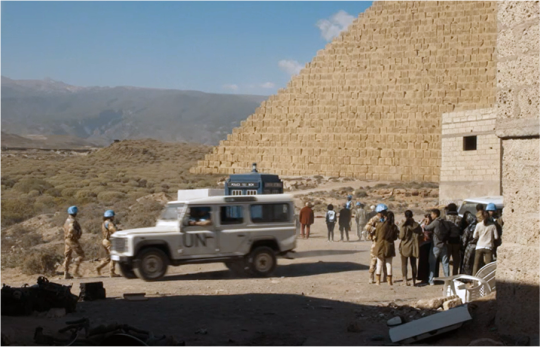
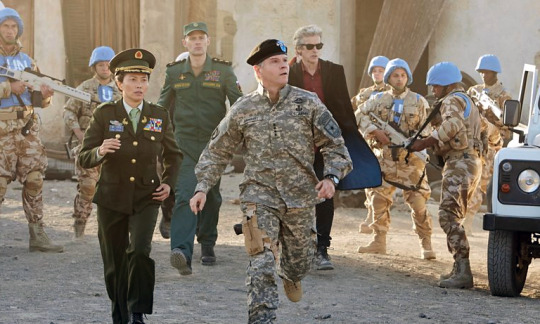
The situation was tense. The Secretary General himself arrived, and was accompanied by the leaders of the three military operations and three unknown individuals.
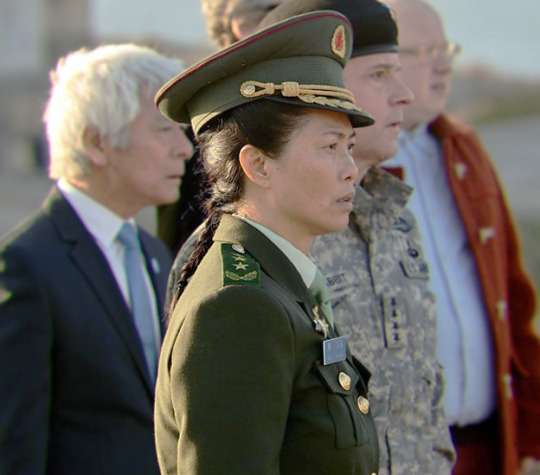
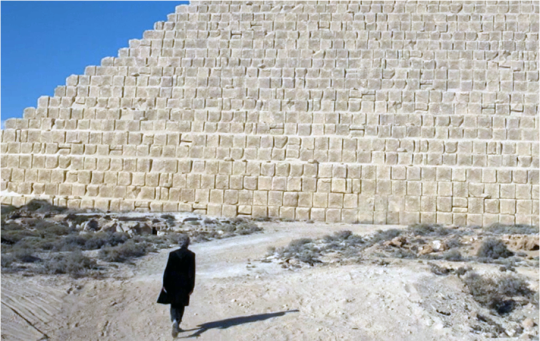
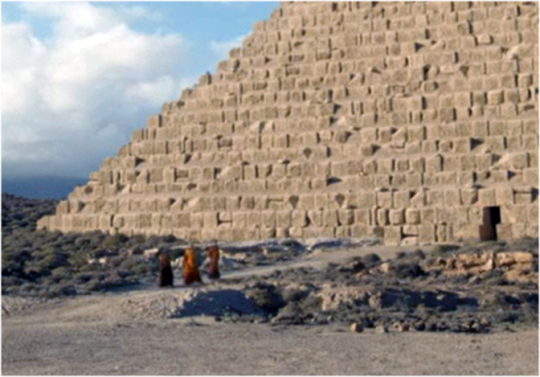
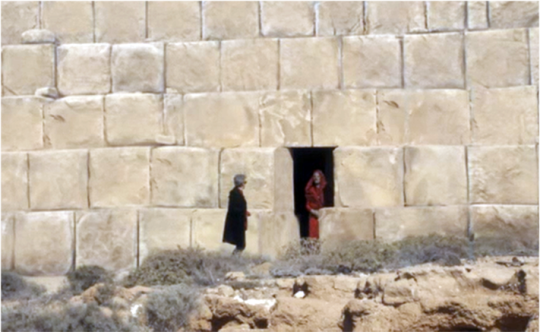
For some reason, one of the unknowns was allowed through the UN barricade. He was seen to approach the pyramid. Using telescopic lenses, it became apparent that he was greeted by entities wearing red shrouds. What was said is unknown, but it appeared he was sent away.
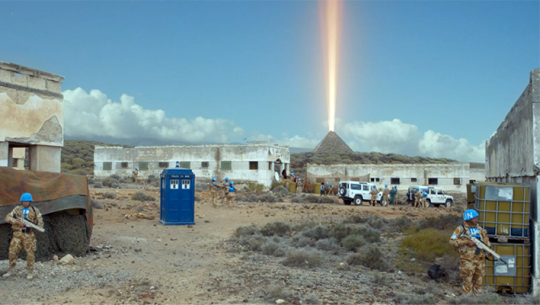
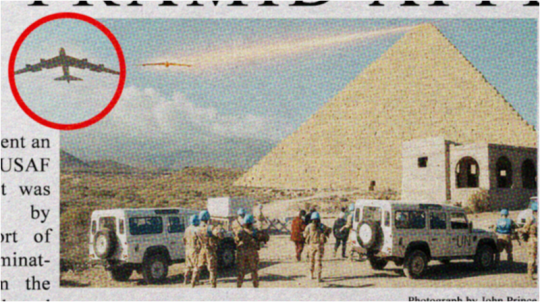
Some time later, the pyramid seemed to be declared a hostile target and a Boeing B-52 Stratofortress and ocean-to-surface missiles. The pyramid is said to have deployed a beam of light to neutralise the threat. No humans were harmed, but this show of power was absolute.
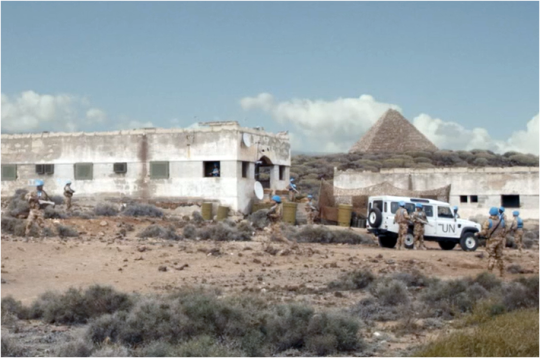
So what happened next?
Ten months later, the pyramid was gone, and all mentions of these events were scrubbed. A few people remember seeing the news reports, some conspiracy theorists - like myself - kept screenshots and newspaper clippings, but overall public knowledge of these events faded rapidly. Nobody can even tell me what the broken statues used to be. You know the ones. You never noticed them but they appeared recently. The plinths are huge and you can see the remains of a symbol that looked like this:
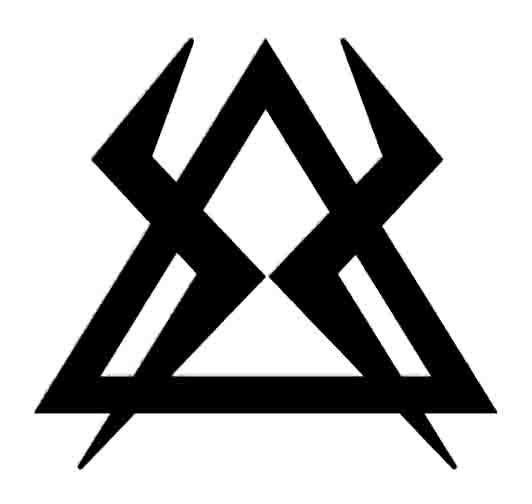
Not one person can explain them.
So unfortunately, I cannot tell you what happened next. However, you may have noticed a few things about the archived photographs I shared here. A blue police telephone box appears in some of them. The box is different from the patented designs, and appears in slightly different locations between photographs. The man who approached the pyramid might also look familiar, especially to students of St Luke's University. I believe this to be an example of "the Doctor" arriving alongside the "blue box" to help humanity. It is one of the most compelling pieces of evidence that the blue box and the Doctor are connected, something I think most of us take for fact by now but some still doubt.
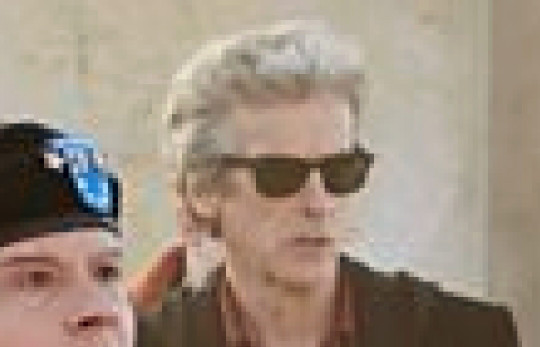
I really wish I had solid answers but it appears whatever method of suppression was used to hide these events affected myself and many of my contacts. However, I think we can all be grateful that disaster was averted. The pyramid is no longer present in Turmezistan, and neither is the looming threat of war. At least, not that war.
2 notes
·
View notes
Text
UPDATE 22: THE BATTLE FOR CARACAS
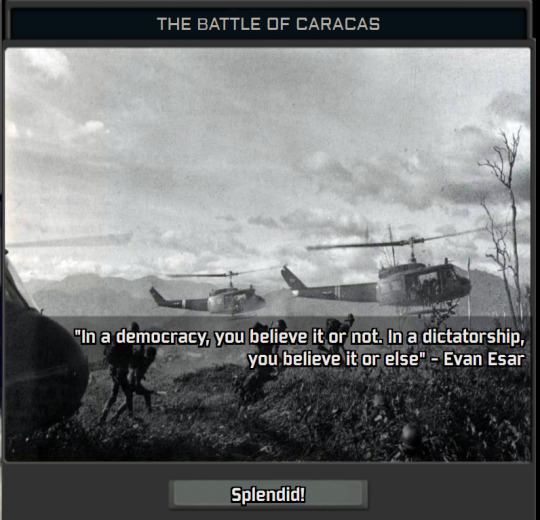
Occupation Zone Caracas, Venezuela. June 1, 1958. - The Battle of Caracas.
In the early morning hours of the 1st of June, what began as coordinated uprisings across satellite cities has exploded into one of the swiftest and most dramatic coups in Latin American history. Without the backing of armored divisions or direct foreign intervention, a coalition of journalists, guerrillas, private militias, and disillusioned military defectors pulled off the impossible: the liberation of Caracas and the collapse of the Jiménez regime.
Phase I: The Spark in the Night
At 12:00 AM, synchronized pamphlets were distributed across the cities of Los Teques, Guarenas, La Victoria, and Maracay, calling upon civilians to rise. The pamphlets — crafted by journalists Beatriz Paredes and Jose Vicente Rangel — urged Venezuelans to “march on Caracas for liberty, dignity, and the soul of the republic.” By 2:00 AM, tens of thousands of protestors and irregular fighters flooded highways and backroads under cover of darkness, converging on the capital.
Phase II: The Distraction and Deception
The regime's response was swift, but misguided. Mistaking the civilian uprisings as the core threat, President Marcos Pérez Jiménez diverted his elite Presidential Guard units to suppress protestors at the Maracay highway junction and the El Paraíso district. This fatal miscalculation opened a window.
While the regime scrambled to contain the outer city chaos, a trained and armed force of 7,050 fighters under Colonel Luis Eduardo Manrique and Luis Moncho Rodríguez entered Caracas through the San Agustín slums and Catia district, moving undetected in small units.
By 4:30 AM, the rebels had silently seized key junctions, cutting power to government buildings and radio towers without a single tank.
Phase III: The Urban Offensive
Just before dawn, hidden guerrilla units, previously embedded within the city by Margarita Pérez, were activated via a secure signal. Now numbering 7,550 fighters, the United Armed Forces launched coordinated attacks on key locations:
La Planicie Presidential Barracks
The Interior Ministry
El Silencio Federal Palace
Street battles erupted across Plaza Bolívar and Avenida Urdaneta, with armed students and defected national guardsmen turning the tide. Despite lacking air or armor support, the rebels overwhelmed loyalist troops through superior numbers, morale, and urban familiarity.
Phase IV: The Fall of Jiménez
By 6:45 AM, with most of the capital under rebel control and gunfire ringing through the halls of power, President Jiménez attempted to flee via helicopter from Miraflores Palace. However, intelligence leaked his plan.
He was captured at 7:03 AM by a rebel unit led by Omar Tovar, reportedly trying to escape disguised as a Catholic priest. Gunfire was exchanged; Jiménez was shot dead after resisting arrest. Confirmation was given by Rafael Caldera marking the end of tyranny.
Phase V: The End?
At 7:05 AM, Allied forces take the presidential room. The throne is empty and cold. Who will be the next leader of Venezuela? Only time will tell.
0 notes
Text
Scope of Artificial Intelligence and Data Science Engineering in India – Career Opportunities After Graduation
In today's fast-paced digital world, the convergence of Artificial Intelligence (AI) and Data Science (DS) has revolutionized the way we interact with technology. From personalized product recommendations to self-driving cars, AI and DS are powering some of the most cutting-edge innovations of the 21st century.
In India, the demand for skilled professionals in AI and DS is skyrocketing, making it one of the most promising career paths for aspiring engineers. In this blog, we’ll dive into what AI and Data Science entail, their growing scope in India, and the career opportunities they present. We will also highlight how Saraswati College of Engineering (SCOE) is nurturing the next generation of AI & DS professionals.
What is Artificial Intelligence and Data Science?
Artificial Intelligence (AI) is the simulation of human intelligence in machines, enabling them to perform tasks like learning, reasoning, problem-solving, and decision-making.
Data Science (DS), on the other hand, is a multidisciplinary field that uses scientific methods, algorithms, and systems to extract knowledge from structured and unstructured data.
Together, AI and DS empower machines to learn from vast datasets and make intelligent decisions. This integration drives innovations like virtual assistants, fraud detection systems, predictive analytics, and autonomous vehicles.
Scope of Artificial Intelligence and Data Science Engineering in India
India is rapidly embracing digital transformation across various sectors including healthcare, finance, education, agriculture, and manufacturing. This shift has massively increased the need for AI and DS professionals.
1. Growing Industry Demand
According to NASSCOM, India is expected to witness over 1 million job openings in AI and DS roles by 2030. Companies across industries are investing heavily in AI and big data analytics to gain a competitive edge.
2. Government Initiatives
The Indian government has launched forward-thinking initiatives like National AI Strategy and AI for All, aiming to promote AI education, research, and nationwide adoption.
3. Startup Ecosystem
India’s booming startup culture, especially in healthcare, fintech, edtech, and retail, is leveraging AI to build smarter, more efficient solutions.
4. Global Recognition
Indian professionals in AI and Data Science are gaining global recognition, with many being hired by leading tech giants such as Google, Microsoft, Amazon, and Meta.
Career Opportunities After AI and DS Engineering
Graduates from AI and DS programs can pursue a wide range of exciting and impactful careers:
🔹 AI Engineer – Develops intelligent algorithms and models. 🔹 Data Scientist – Extracts actionable insights from complex datasets. 🔹 Machine Learning Engineer – Builds predictive and automated systems. 🔹 Data Analyst – Supports decision-making with statistical insights. 🔹 NLP Engineer – Creates systems that process and understand human language. 🔹 Computer Vision Engineer – Works with image and video data to develop intelligent visual applications.
These roles are in demand across IT, healthcare, e-commerce, finance, logistics, and more.
Why Choose Saraswati College of Engineering (SCOE) for AI and DS Engineering?
Saraswati College of Engineering (SCOE), Navi Mumbai, has quickly emerged as a center of excellence for AI and Data Science education. The college’s Department of Artificial Intelligence and Data Science is dedicated to shaping the future tech leaders of India.
Key Highlights of SCOE's AI & DS Department:
Industry-Aligned Curriculum – Crafted to keep pace with current and emerging tech trends.
Expert Faculty �� A strong team with academic depth and real-world industry experience.
Hands-on Learning – Students gain practical skills through projects, workshops, and labs.
Corporate Collaborations – Strong partnerships with top companies for internships and placements.
Research Focus – Encouragement for students to explore research, participate in hackathons, and publish papers.
Strong Placement Support – A solid track record of placements in reputed companies and startups.
By enrolling in the AI and DS program at SCOE, students gain not only technical expertise but also the soft skills and industry exposure required to thrive in today’s competitive tech world.
Final Thoughts
Artificial Intelligence and Data Science are not just buzzwords—they are the driving forces behind modern innovation and transformation. As the world becomes more data-driven, the scope of Artificial Intelligence and Data Science Engineering in India is bound to expand rapidly.
For aspiring engineers, pursuing AI and DS from a reputed institution like Saraswati College of Engineering can be a gateway to exciting opportunities and a successful career in technology.
Ready to shape the future with AI and DS? Begin your journey at Saraswati College of Engineering today.
0 notes
Text
Best BSc Maths, Physics, Computer Science College in Warangal
Where Academic Excellence Meets Industry Innovation
In India’s rapidly evolving educational landscape, science graduates are at the core of national growth—powering digital advancements, space missions, artificial intelligence, and tech entrepreneurship. At the confluence of tradition and technology lies Warangal, an academic powerhouse in Telangana known for its quality degree education. Among the standout institutions, Bharathi Degree College rises above as the best degree college in Warangal, especially for the BSc (Maths, Physics, Computer Science) program.
This in-depth guide explores why Bharathi Degree College is considered the benchmark for science education, delivering a globally relevant curriculum, outstanding faculty, and transformative career opportunities.The Rising Demand for Science Graduates in India
In 2025, demand for science professionals is higher than ever:
India’s digital economy is expected to reach $1 trillion by 2030 (MeitY report)
AI, data science, quantum computing, and space tech sectors are expanding fast
Government and private sectors are increasingly hiring BSc graduates for research and tech-intensive roles
Just like the wedding photography industry in India has shifted from posed portraits to cinematic, drone-based, tech-enhanced storytelling, science education too has embraced digital labs, simulation-based learning, and hands-on innovation.What Sets Bharathi Degree College Apart for BSc? 1. Future-Ready Curriculum
Bharathi Degree College’s BSc program integrates:
Modern Physics with applications in material science, electronics, and optics
Mathematics focusing on applied calculus, real analysis, and computational models
Computer Science with full-stack development, cloud computing, AI & machine learning
2. Research-Driven Learning
Real-world science problems as classroom projects
Collaborative mini-research with labs and local industry
Data visualization and AI model development using R, Python, MATLAB
3. Advanced Laboratory Infrastructure
Smart physics labs with simulation-enabled devices
Computer labs with upgraded systems for coding, analytics, and real-time data modeling
Math labs using graphing software and statistical tools
4. Interdisciplinary Integration
Today’s industries require convergence:
Physics + Programming = Robotics, Quantum Computing
Maths + CS = Predictive Algorithms, AI Systems
CS + Physics = Embedded Systems, IoT
The BSc structure here prepares students for this convergence.Digital Innovation in Education: Inspired by Wedding Photography Trends
Modern-day wedding photography includes:
360° virtual walkthroughs
Drone aerial shots
Instant cloud sharing
Likewise, Bharathi Degree College delivers:
Virtual physics labs and AR-based demonstrations
Coding competitions, hackathons, and algorithm-building challenges
AI-assisted learning platforms and real-time assessments
Faculty Excellence That Drives Results
The backbone of Bharathi’s BSc program is its experienced and constantly evolving faculty:
Professors with PhDs and research backgrounds in astrophysics, cryptography, and computational logic
Industry-recognized certifications in cloud platforms, machine learning, and scientific modeling
Regular guest lectures and workshops curated by leading scientists and technology experts
Their teaching style emphasizes practical utility, ethical problem-solving, and global relevance.Student Outcomes and Global Careers
Graduates from the BSc Maths, Physics, Computer Science program have moved into:
Data Science & Analytics roles at top firms in Hyderabad, Bengaluru, and abroad
Higher studies at institutions like IISc, IITs, and international universities
Tech entrepreneurship, launching AI-based or IoT startups
Bharathi Degree College’s placement and mentoring cell ensures each student gets a tailored academic-to-career roadmap.Course Structure Overview Core Subjects
Linear Algebra, Real Analysis, Quantum Physics, Data Structures, Algorithms
Labs & Projects
Mathematical Modeling Projects
Physics Experiments in Optics and Electronics
Software Development Projects
Add-On Skill Certifications
Python for Data Science
MATLAB & LaTeX for Science Computing
Cybersecurity & Network Protocols
FAQs: Insights About the Program
Q1: Is this program aligned with NEP 2020? Yes. The curriculum is modular, skill-integrated, and industry-aligned as per NEP guidelines.
Q2: Can I pursue higher education abroad with this degree? Absolutely. The program’s academic structure and credits are internationally recognized.
Q3: What is the placement support like? Strong. The college offers placement training, resume building, mock interviews, and alumni mentorship.
Q4: Are real-time projects mandatory? Yes. Every semester includes lab-based or interdisciplinary projects for hands-on exposure.
Q5: Is Bharathi Degree College recognized nationally? Yes. It is widely regarded as the best degree college in Warangal, known for academic rigour and career outcomes.Final Thoughts: Where Science Meets Possibility
Bharathi Degree College is not just a degree destination—it is a future-building institution. With its focus on academic innovation, practical exposure, and tech-empowered teaching, it offers one of India’s most future-ready BSc programs.
In a city that blends history with modernity, Warangal is setting new standards for science education—and Bharathi Degree College stands tall as the best degree college in Warangal for BSc Maths, Physics, and Computer Science.
Whether you're a science enthusiast, a startup dreamer, a researcher, or a tech explorer—your journey begins here.
0 notes
Text
Paintings and Animated Games as part of the ongoing Xtreme Champions League, India’s first national-level gaming championship

Paintings and Animated Games as part of the ongoing Xtreme Champions League, India’s first national-level gaming championship
Noida, India : Taking a bold step in blending art with technology, the International Chamber of Media and Entertainment Industry (ICMEI) in association with the AAFT School of Animation proudly unveiled an Exhibition of Animated Paintings and Animated Games as part of the ongoing Xtreme Champions League, India’s first national-level gaming championship.
The exhibition was inaugurated by Ms. Vrinda Sood, Founder and CEO of Citrus Ink, who praised the initiative for empowering young digital artists and gaming professionals. “This exhibition is a powerful testament to how storytelling, technology, and imagination can converge to create truly immersive experiences. I’m thrilled to see such talent and innovation coming from young Indian creators,” said Ms. Sood during her address.
Dr. Sandeep Marwah, President of ICMEI and AAFT School of Animation, emphasized the importance of such platforms in today’s creative economy: “Animation and gaming are no longer just academic disciplines—they are industries of the future. This exhibition is an effort to recognize and nurture the next generation of creative thinkers and game designers who will define the global entertainment landscape.”
The exhibition drew the attention of international dignitaries and industry leaders, who were present to lend support and encouragement to the participants. Distinguished guests included: Hiroki Kawasaki, Senior Director of Business Development, JETRO (Japan External Trade Organization), Alfredo Caldera, Cultural Counsellor, Embassy of Venezuela, Maria Jose Gomez, Counsellor, Embassy of Venezuela, Avital Barak, Cultural Counsellor, Embassy of Israel, Ayush, Founder, Mellow Fox Studios, Jenica Kalra, JETRO, Dr. Manoj Agarwal, Campus Director, AAFT, and Ashish Garg, Dean, AAFT School of Animation
The exhibition, featuring dozens of animated artworks and game designs by student creators, received high praise for its creativity, technical skill, and storytelling depth. It served as a vibrant platform to showcase the interdisciplinary strength of animation, game design, and digital art.
As part of the Xtreme Champions League, the exhibition reinforces ICMEI and AAFT’s vision to cultivate a globally competitive, culturally rooted generation of digital content creators.
#Paintings and Animated Games as part of the ongoing Xtreme Champions League#India’s first national-level gaming championship#Dr. Sandeep Marwah President of AAFT
0 notes
Text
Protesters waving flags, chanting slogans and blowing whistles massed in the Serbian capital on Saturday to join the latest in a series of student-led demonstrations that have mounted an unprecedented challenge to President Aleksandar Vucic’s government.
Traffic was at a halt across the city and the main boulevards and intersections were completely blocked as masses of protesters headed for the city centre on foot.
As well as students and members of the public, farmers driving tractors and large groups of bikers also joined the protest. Many of the protesters chanted “Pump it!”, a slogan of the ongoing protests.
One protester, who had travelled from Serbia’s second city Novi Sad to Belgrade and gave her name as Svetlana, held a blue flag with “The Constitution of the Republic of Serbia” written on it.
“If everyone obeyed the constitution and the law, we would not be in the situation we are in,” she explained.
“For years, we have been watching laws and constitutions being broken and investigative journalists writing about it, but nothing happens,” she added.
Protesters have been demonstrating for months, demanding official accountability after a concrete canopy collapsed at Novi Sad train station in November, killing 15 people – a disaster they believe highlights high-level corruption and negligence under Vucic’s government.
On Saturday morning, streams of vehicles were seen heading for the capital from all over Serbia to join the mass rally, which is being held under the name “15th for the 15”. The Serbian state railway company and several private bus companies suspended all their services to Belgrade, causing protesters to claim they were doing the government’s bidding.
Many protest marchers also arrived on Belgrade on foot on Friday evening and received a celebratory welcome from crowds of well-wishers in the capital.
One of them was Darko Sper, president of the Independence Union of Culture, Arts and Media, who was walked from Novi Sad, setting out on Thursday morning.
Sper, who also walked from Novi Sad to Belgrade to participate in an opposition protest 25 years ago, told BIRN that the welcome on Friday was “unbelievable, it was such an atmosphere, everything was lit up and the rain started but no one cared”.
Protesters on Saturday held 15 minutes of silence in memory of the 15 Novi Sad train station victims at 11.52am, the time the disaster happened.
On Saturday afternoon, they were set to rally outside the National Assembly in the city centre. In a park opposite the Assembly, President Vucic’s ruling Serbian Progressive Party has set up an encampment of counter-demonstrators, which is being guarded by police. A defensive line of tractors was parked around the pro-government camp on Friday morning.
The student-led protests have become the most serious challenge to Vucic’s rule since the Progressive Party came to power in 2012. Vucic has described the protests as an attempted revolution.
Saturday’s rally is the latest in a series of mass gathering in the four biggest cities in the country – Belgrade, Nis, Kragujevac and Novi Sad – as well as smaller protests in almost every town across the country.
The students leading the protests have four demands, starting with the publication of all documents concerning the Chinese-led renovation of Novi Sad railway station before the deadly disaster last November. The others demands are: the prosecution of all those involved in attacking students and professors during their protests about the disaster, and their dismissal if proven to be public officials; a halt to the prosecution of students arrested during the protests; and a 20-per-cent increase in the budget for higher education.
3 notes
·
View notes
Text
anime recs
mermaid melody pichi pichi pitch - 2 seasons - comedy/shojo/drama
summary: lucia must fight water demons while hiding her mermaid identity from the boy she loves
drowning sorrows in raging fire - 1 season - drmaa
summary: new director of a supernatural department, xuan ji meets thousand year old sheng lingyuan, an encounter that leads to a bigger conspiracy
kekkaishi - 1 season - horror
summary: yoshimori and tokine guard their land against attacks from demons, also known as ayakashi. the demons are searching for a magical power that would allow them to take over the human world. using a special form of magic, the two students hold the demons at bay
summary: a brave defender rallies to save the people of earth from an evil lord's force, converging on the city of tokyo
sleepy princess in the demon castle - 1 season - comedy
summary: when beloved princess syalis from the nation of goodereste is kidnapped by twilight the demon king, the only thing shes concerned with is getting a good nights sleep in the castle
angels egg - sci fi/fantasy
summary: a mysterious young girl wanders a desolate, otherworldy landscape, carrying a large egg
0 notes
Text
Week 11: Digital Citizenship and Conflict - Social Media Governance
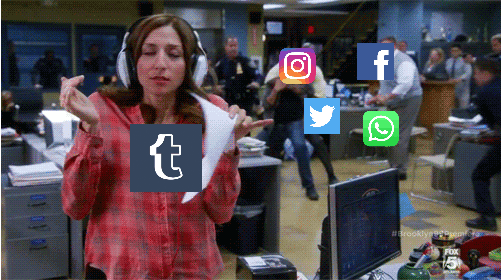
It is important to clarify that we adore the internet. We are dependent on it. We have memes about it. In the morning, we rage-scroll on it. Online life is more than simply buzz and catchy music, though; it's also about being a digital citizen in a place where government is, to put it mildly, mediocre.
The goal of social media was to make expression more accessible. Rather, it seems to have given trolls a loudspeaker at times. Haslop, O'Rourke, and Southern (2021), for example, explore the #NoSnowflakes culture in UK student groups, where harassment is justified as 'just jokes', but in practice, it is a reinforcement of gendered power disparities. Alternatively said, casual cruelty is still cruel.
But doomscrolling isn't the only thing. Out there, there are digital warriors changing the story. As an example, consider the artist in Vitis and Gilmour's (2017) study who created strong, amusing Instagram callouts out of unwanted "dick pics" (ew). It's incredibly fulfilling, protesting, and artistic.
Journalist Jay Thompson (2023) notes that new research is finally assisting platforms and journalists in taking online hate more seriously! Because, similar to Twitter timelines, newsrooms have turned into hotspots for abuse.
Speaking of Twitter, do you recall when reporter Siobhan Fenton voiced her concerns about the constant harassment she endured for reporting on transgender issues? Our digital systems are so flawed that telling the truth results in targeted harassment.
The most important query is: where are the rules? When it comes to algorithms, social media governance frequently feels like the Wild West. Not when people are hurt, but when it's profitable or PR-friendly, platforms respond. Digital citizenship entails being aware of your rights as well as when the system isn't functioning properly.
We require more effective moderation tools, openness from internet behemoths, and real repercussions for inappropriate activity. Users are currently burdened with reporting, blocking, and surviving, which is taxing. Let's be loud, intelligent, and incredibly persistent. We still show up even if the internet might be a chaos. We simply begin to appear more intelligently.
References:
-Haslop, C., O’Rourke, F., & Southern, R. (2021). #NoSnowflakes: The toleration of harassment and an emergent gender-related digital divide, in a UK student online culture. Convergence, 27(5), 1418–1438.file:///Users/revekka/Downloads/Haslop%20%23nosnowflakes%20online%20harassment.pdf
-Thompson, J. (2023, July 25). New journalism research will help mitigate the harms of online hostility [Media release]. Australian National University. https://freilich.anu.edu.au/news-events/blog/new-journalism-research-will-help-mitigate-harms-online-hostility
-Vitis, L., & Gilmour, F. (2017). Dick pics on blast: A woman’s resistance to online sexual harassment using humour, art and Instagram. Crime, Media, Culture, 13(3), 335–355. https://doi.org/10.1177/1741659016652445
-Fenton, S. [@SiobhanFenton]. (2018, March 21). Here’s me talking about online abuse and trans issues on BBC Breakfast this morning… [Tweet]. Twitter. https://twitter.com/SiobhanFenton/status/976436261782212608
0 notes
Text
IAAN Students Engage in Insightful Dialogue with MP Anurag Thakur at Constitution Club of India

In a remarkable event that brought together future media professionals and a distinguished political leader, students of IAAN School of Mass Communication had the unique opportunity to engage in a thought-provoking discussion with Anurag Thakur Sir, Member of Parliament. The exclusive event took place at the prestigious Constitution Club of India, New Delhi, creating a vibrant platform for young minds to interact directly with a key policymaker.
Bridging the Gap Between Media and Governance
The event was designed to provide IAAN students with firsthand insights into the workings of Indian democracy and the critical role media plays in shaping public discourse. Anurag Thakur Sir, known for his dynamic approach to politics and communication, shared his perspectives on governance, policy challenges, and the evolving relationship between media and political institutions.
For the aspiring journalists and media professionals at IAAN, this session was a rare opportunity to deepen their understanding of how political narratives are crafted and communicated to the public. The interactive format encouraged students to ask questions, fostering a lively exchange of ideas that highlighted the responsibilities of both politicians and the media in a democratic society.
Learning Beyond the Classroom
At IAAN, experiential learning is a cornerstone of the curriculum, and this event perfectly embodied that ethos. Engaging with a Member of Parliament allowed students to move beyond theoretical studies and witness real-world applications of political communication and media ethics.
Students gained valuable insights into the importance of balanced reporting, the challenges of misinformation, and the power of the press in holding governments accountable. The discussion also touched upon current national issues, media regulations, and the role of digital platforms in modern political communication.
Empowering the Next Generation of Media Leaders
The interaction with Anurag Thakur Sir served not only as an educational experience but also as an inspiration for IAAN’s students to pursue their careers with a sense of purpose and responsibility. Being able to directly question and learn from a senior political figure helped reinforce the importance of credibility, integrity, and courage in journalism.
This event is a testament to IAAN’s commitment to providing its students with unique opportunities that prepare them to become thoughtful, well-informed media professionals who can contribute meaningfully to society.
Conclusion
The exclusive session at the Constitution Club of India was more than just a meeting; it was a convergence of ideas, aspirations, and a shared commitment to democratic values. IAAN School of Mass Communication continues to foster environments where students can interact with leaders, learn from real-world experiences, and step confidently into their future roles as storytellers, analysts, and watchdogs of democracy.
0 notes
Text
Voices for Peace: HIMCOM Students Join Times Now’s Kavi Sammelan to Promote Harmony Through Poetry
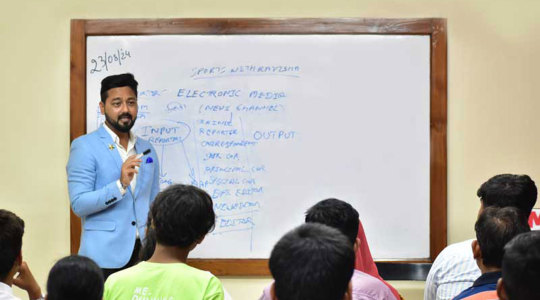
On May 25, 2025, students from the Heritage Institute of Management and Communication (HIMCOM) participated in a unique and timely event at the Times Now studio — a Kavi Sammelan (poetry conclave) that focused on the delicate India-Pakistan relationship. At a time when political tensions often dominate headlines, this poetic forum offered a refreshing and thoughtful space where creativity served as a catalyst for dialogue and peace.
A Platform for Thoughtful Expression
The event, titled "Voices for Peace," was more than just a celebration of poetry. It was a convergence of young minds, seasoned poets, and media professionals who believe in the power of words to bring about social change. The central theme revolved around peace, cultural understanding, and diplomacy, particularly in the context of the long-standing India-Pakistan dynamic.
For media students in India, events like this serve as real-world classrooms. While theory teaches the principles of communication, platforms like the Kavi Sammelan demonstrate how those principles play out in practice — how a well-articulated poem or performance can stir emotions, spark dialogue, and even challenge narratives.
The Role of Media in Peacebuilding
HIMCOM students were not merely observers; they actively participated in the discussions and performances. The session gave them a firsthand understanding of how media can act as a bridge between nations, especially when paired with creative expression. The visit also offered valuable insight into how mainstream news platforms like Times Now engage with softer aspects of journalism — those that lean toward culture, art, and diplomacy rather than just politics and conflict.
Students noted how the format of a Kavi Sammelan differs from traditional news panels. There was no debate for the sake of ratings; instead, the platform encouraged empathetic listening and thoughtful discourse. It was a lesson in how emotional intelligence and cultural sensitivity can enhance journalistic storytelling, especially in conflict zones.
Learning Beyond the Classroom
For students pursuing careers in mass communication, journalism, or public relations, the experience was deeply enriching. Many expressed how the visit broadened their understanding of the ethical responsibilities of media professionals. When covering sensitive international issues, journalists must strike a balance between factual reporting and cultural nuance. Poetry, as witnessed at the event, allows for that nuance to be expressed powerfully.
The session also served as a case study in media event coverage. From observing how Times Now handled guest coordination to the camera work, lighting setups, and editorial decision-making, HIMCOM students got a behind-the-scenes look at what goes into producing a broadcast event that is both socially impactful and media-friendly.
Bridging Nations Through Culture
The poetic verses shared during the event highlighted shared histories, common pains, and universal hopes. Rather than focusing on divisions, the poets — and the students who responded to them — emphasized themes of unity, shared humanity, and the potential for peaceful coexistence. This cultural approach to diplomacy underscored the idea that while governments may struggle to find common ground, art and culture often succeed where politics fails.
A Legacy of Engagement
This visit is one of many initiatives HIMCOM undertakes to ensure that its students are industry-ready and socially aware. As a premier mass communication college in India, HIMCOM prioritizes experiential learning, encouraging students to participate in real-world media events, industry workshops, and social impact forums.
The Kavi Sammelan at Times Now was more than just a field trip; it was a profound learning experience. It reminded all participants — especially future journalists and communicators — that behind every news story is a human story. And sometimes, the most powerful way to tell that story is through verse.
0 notes